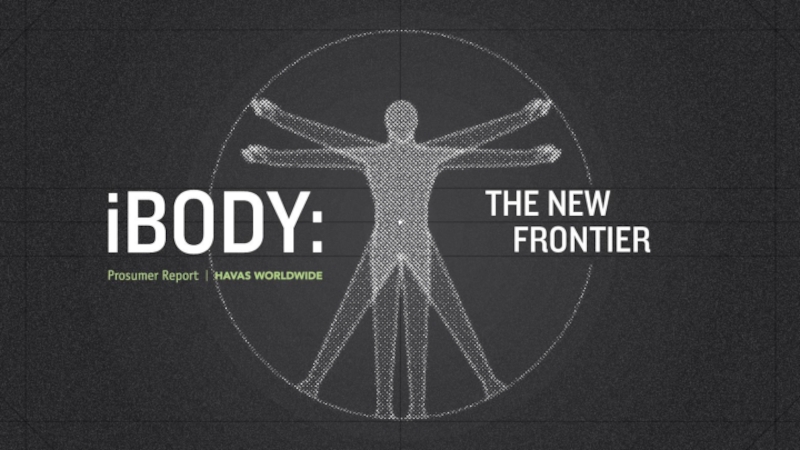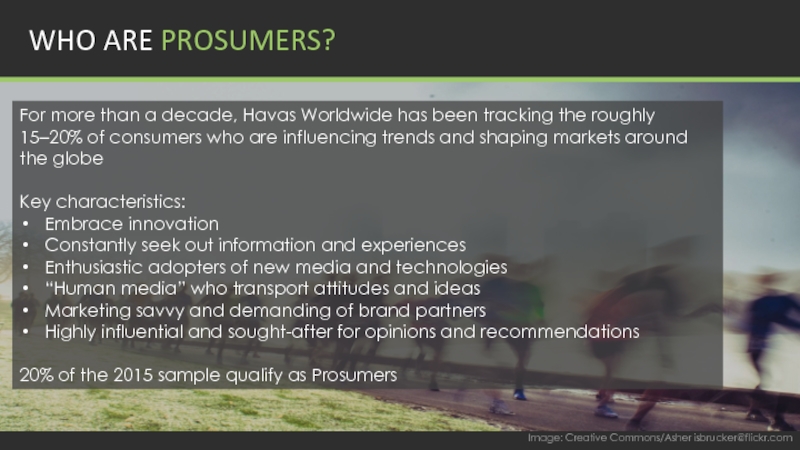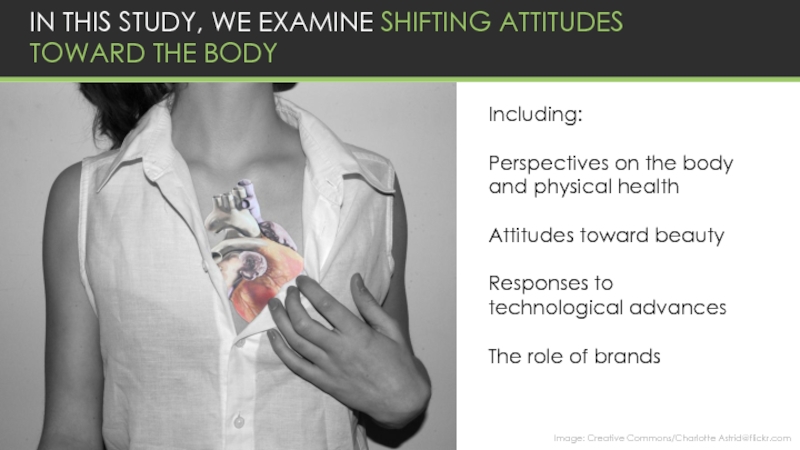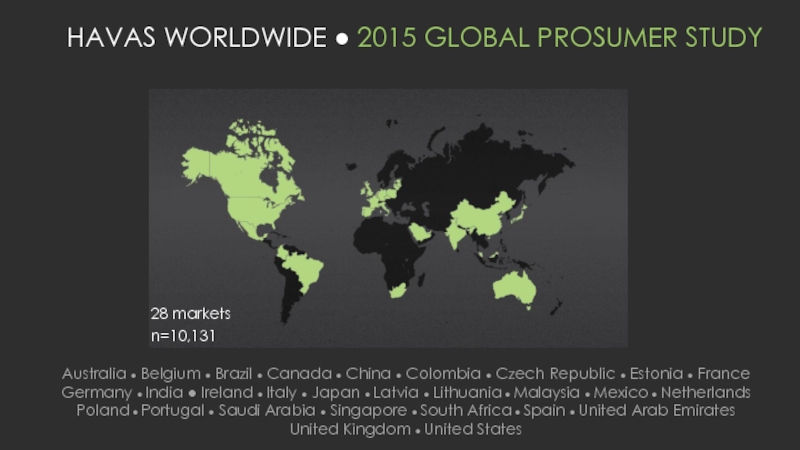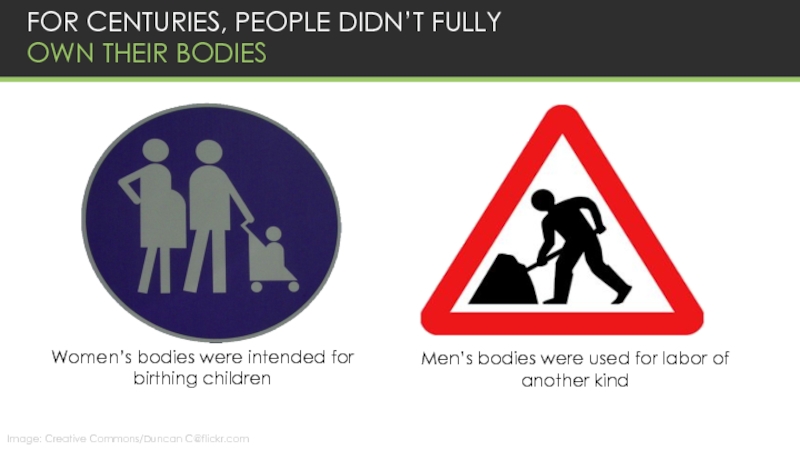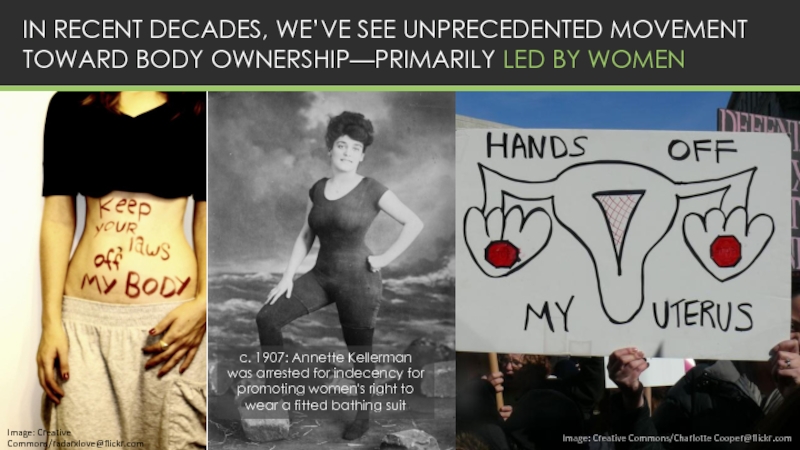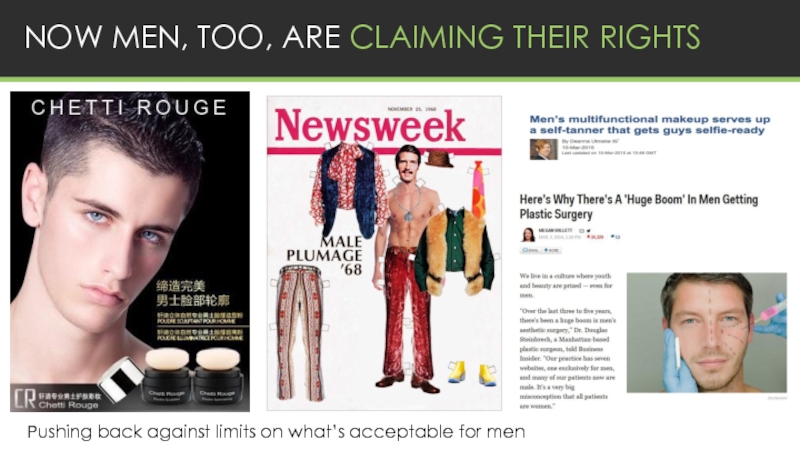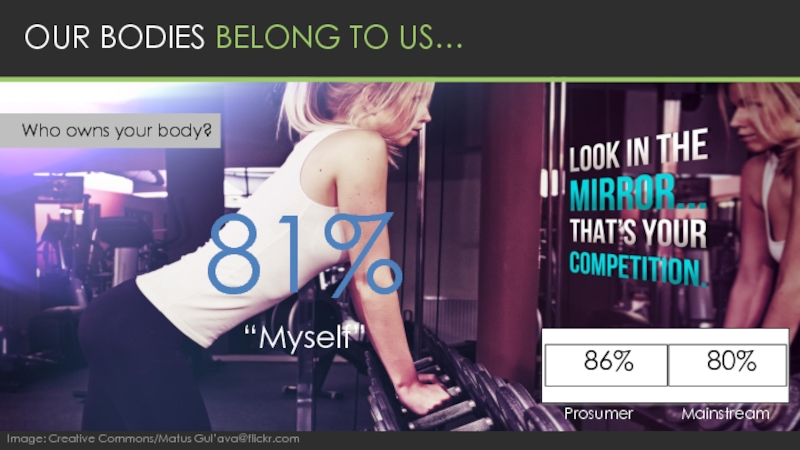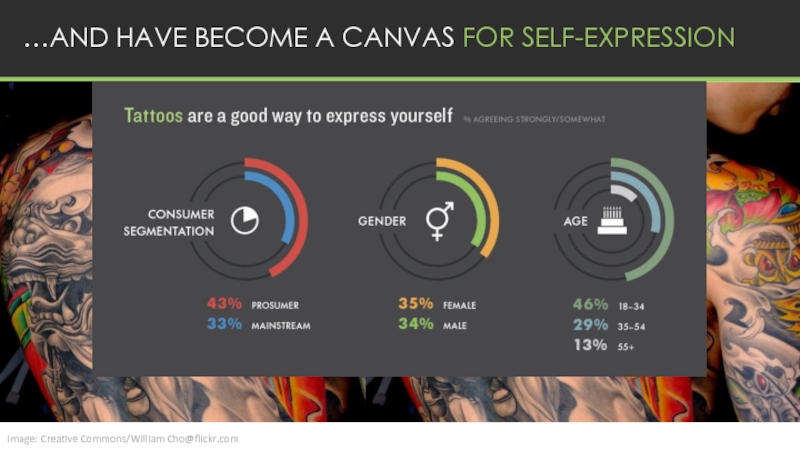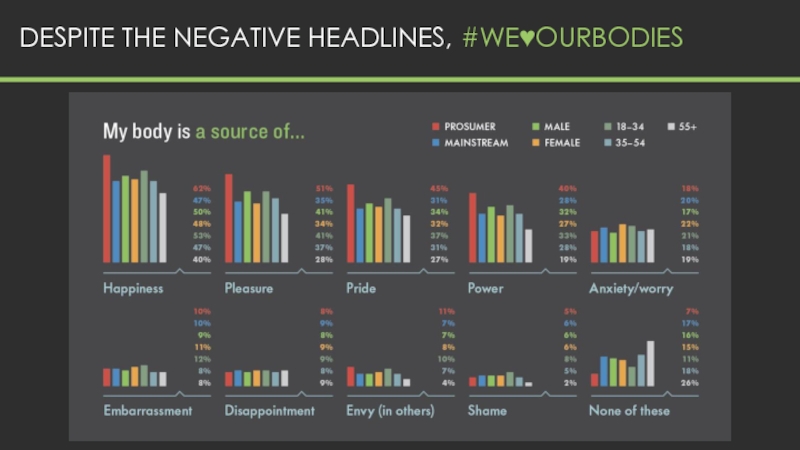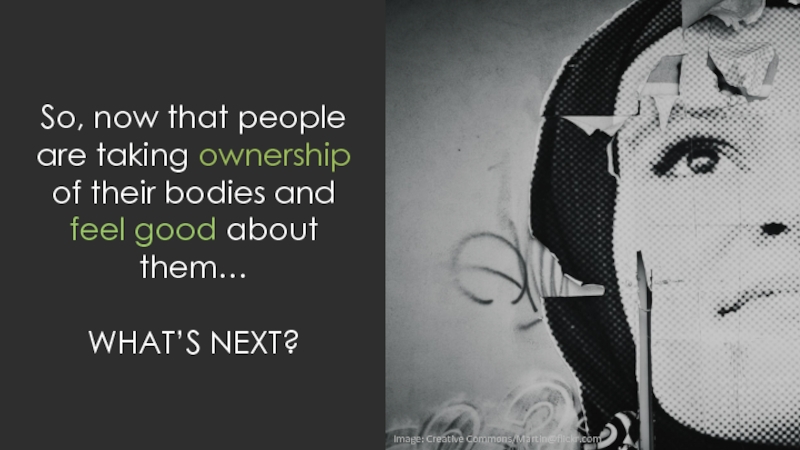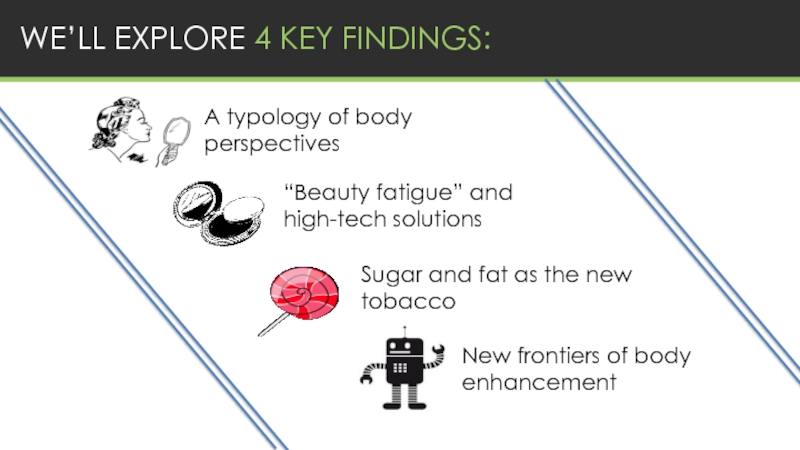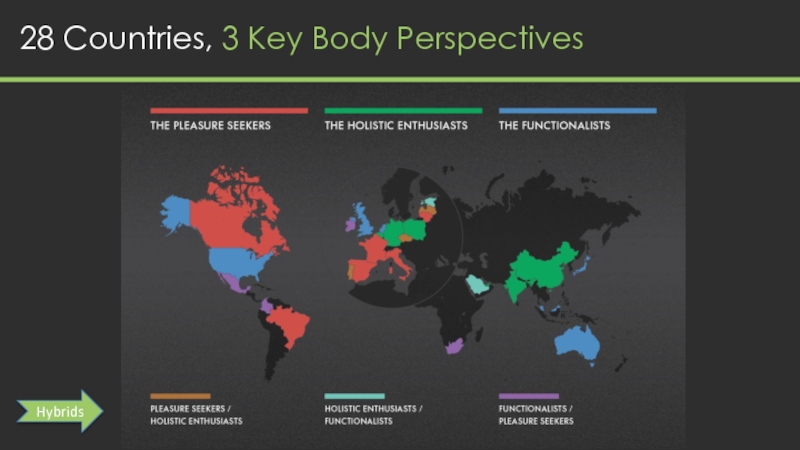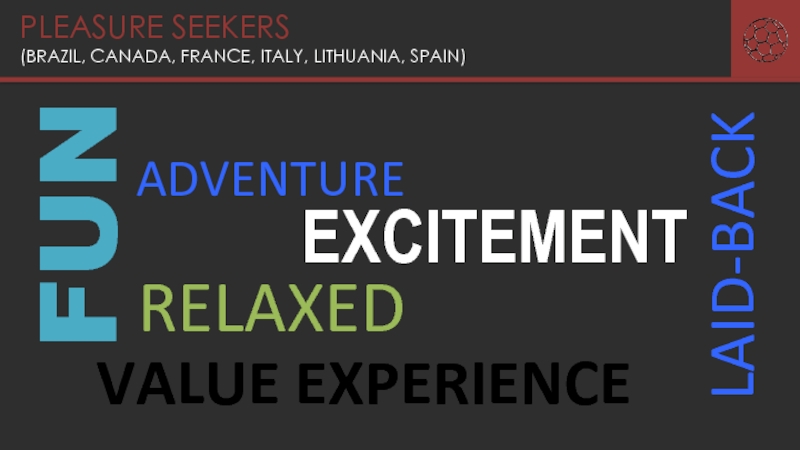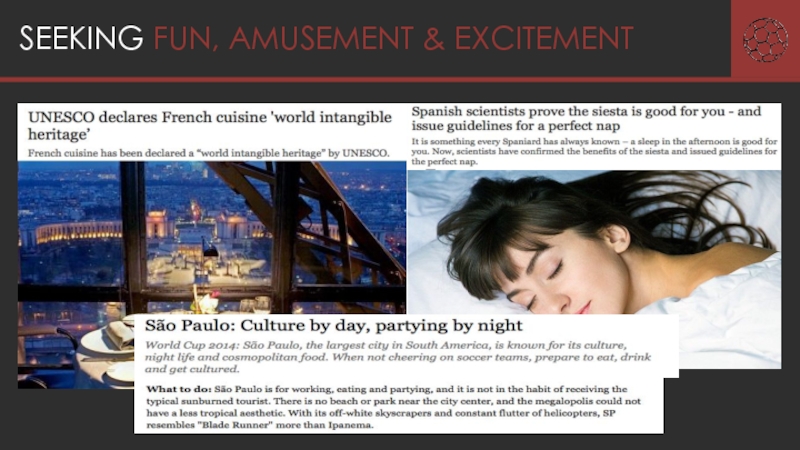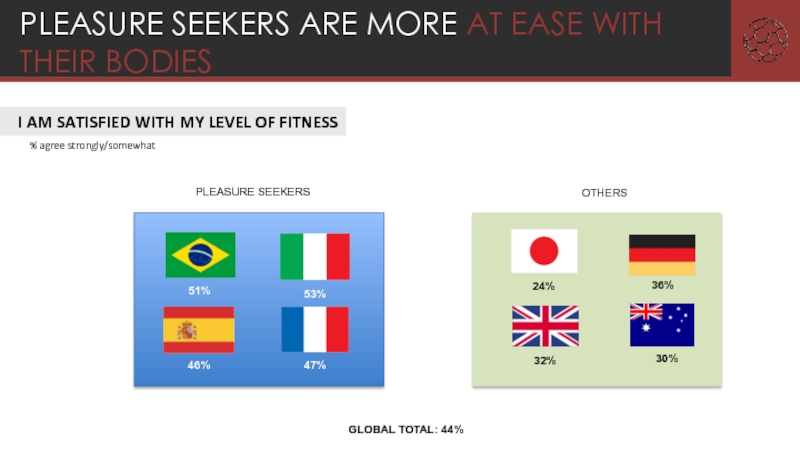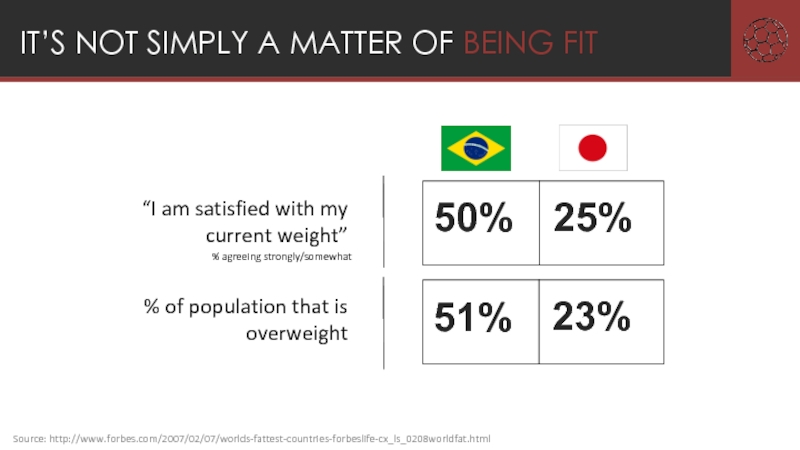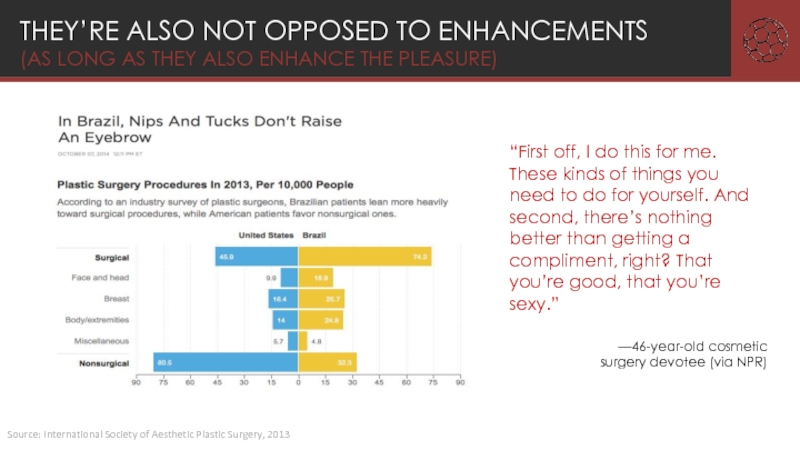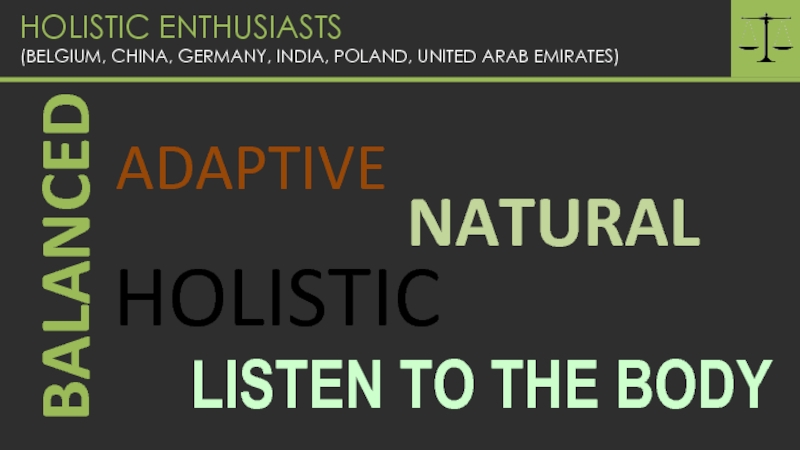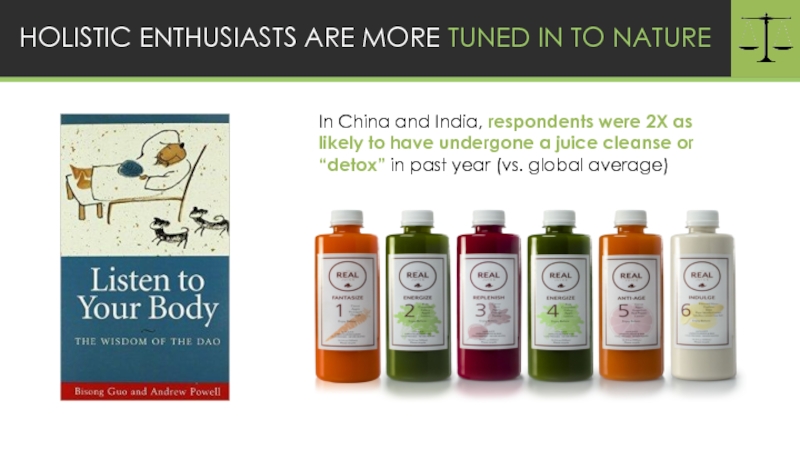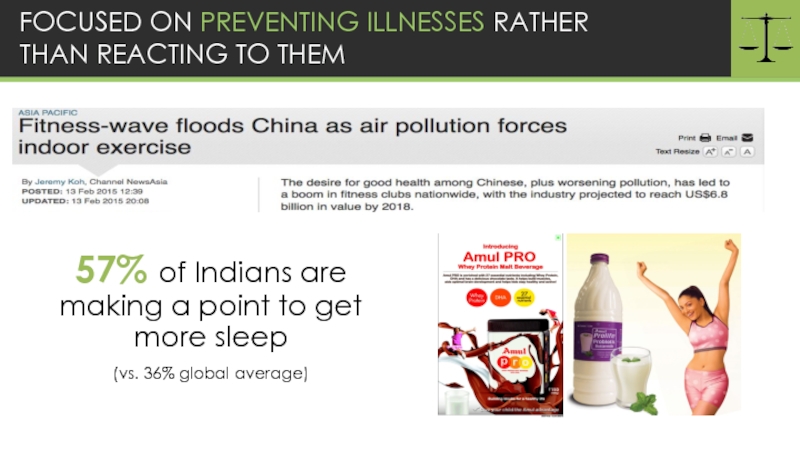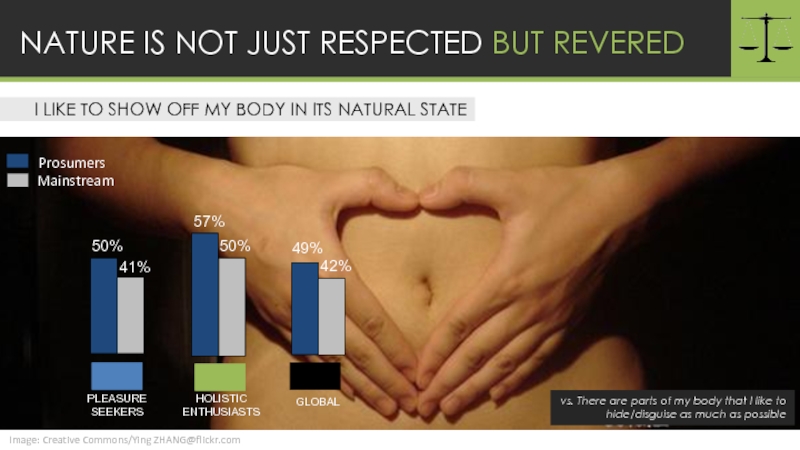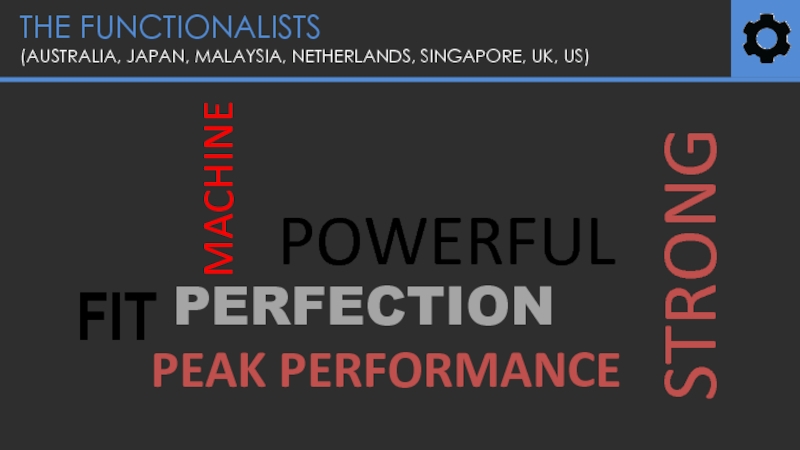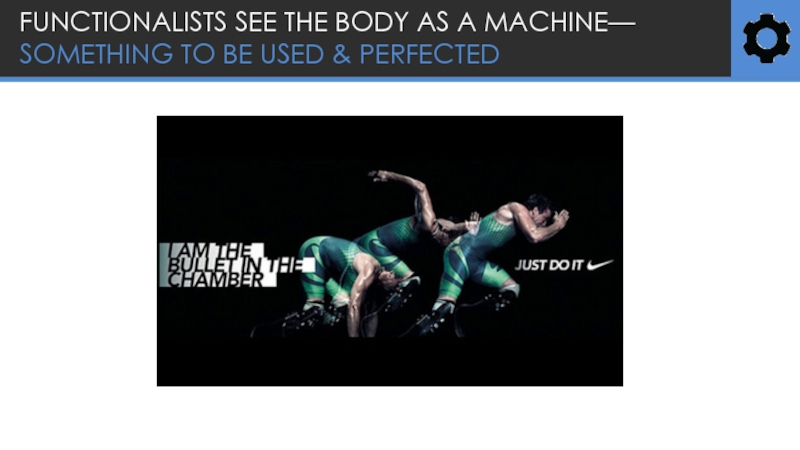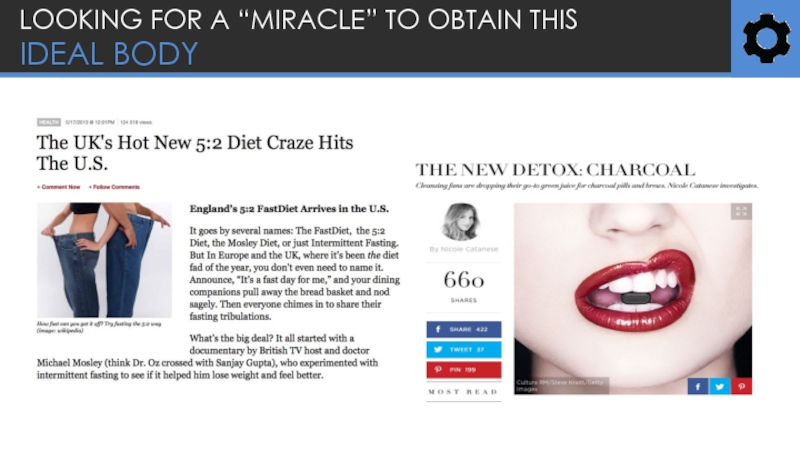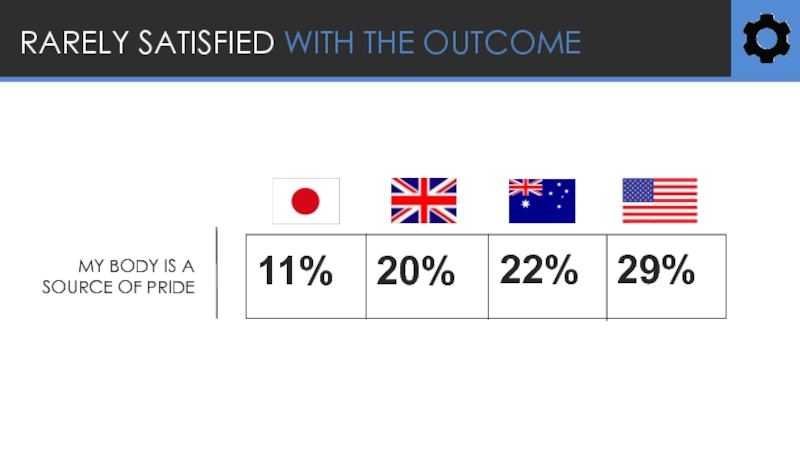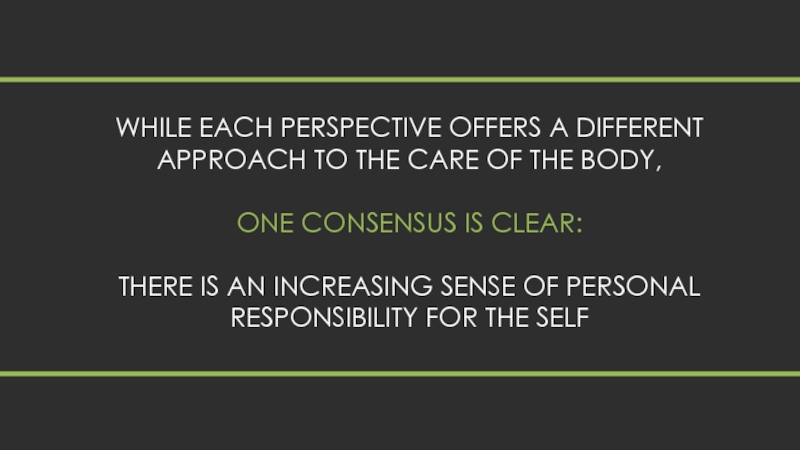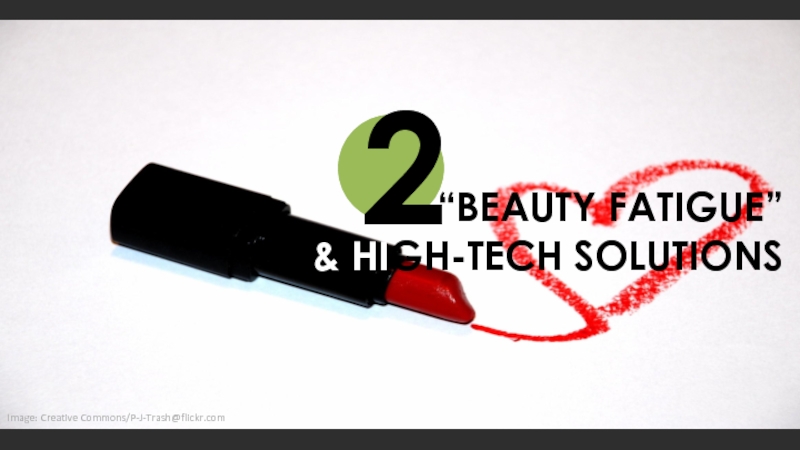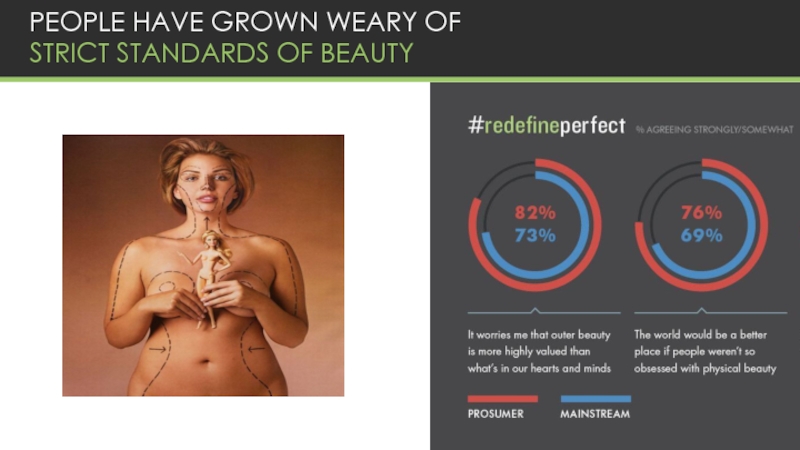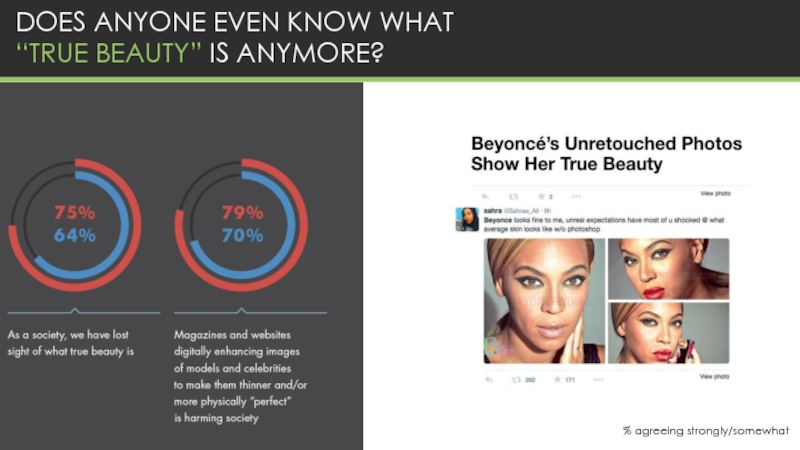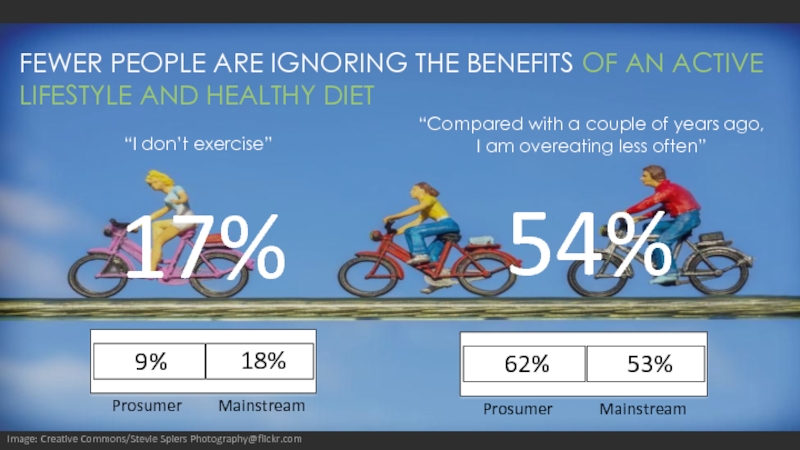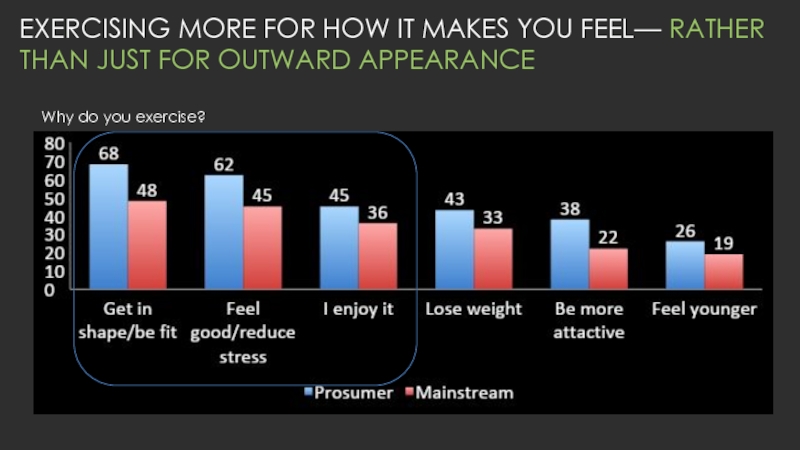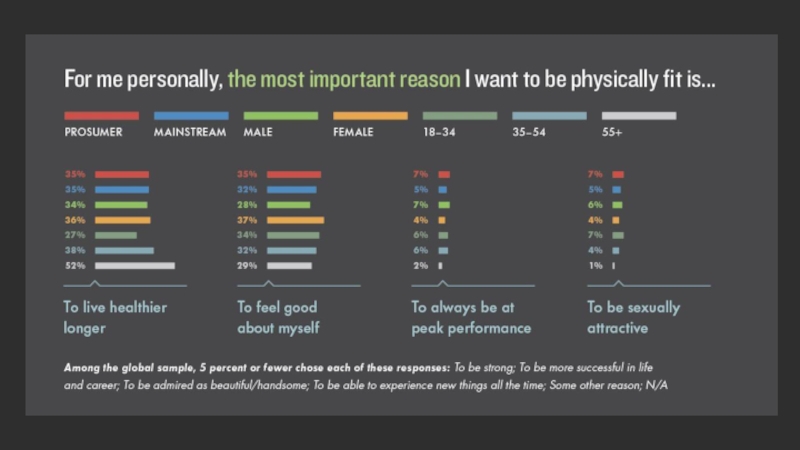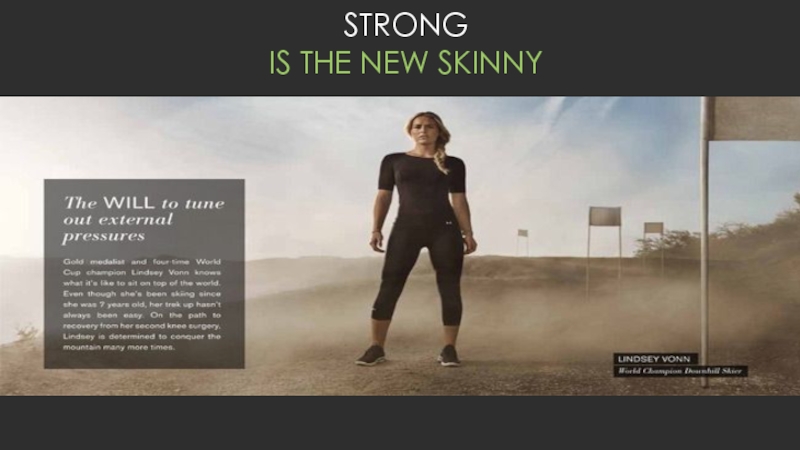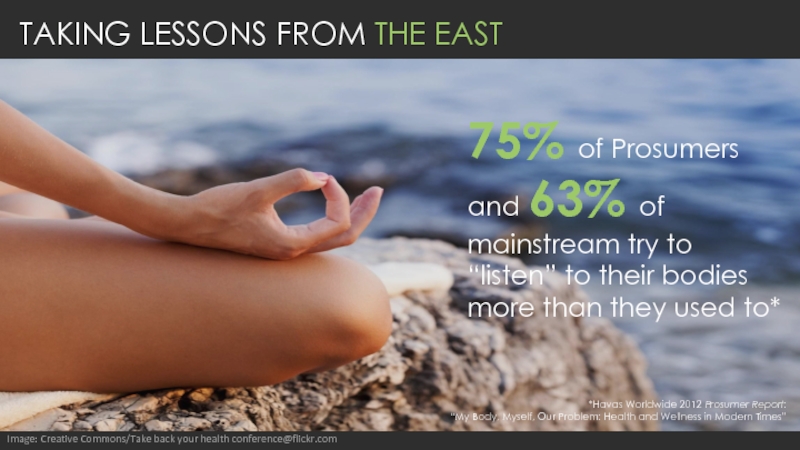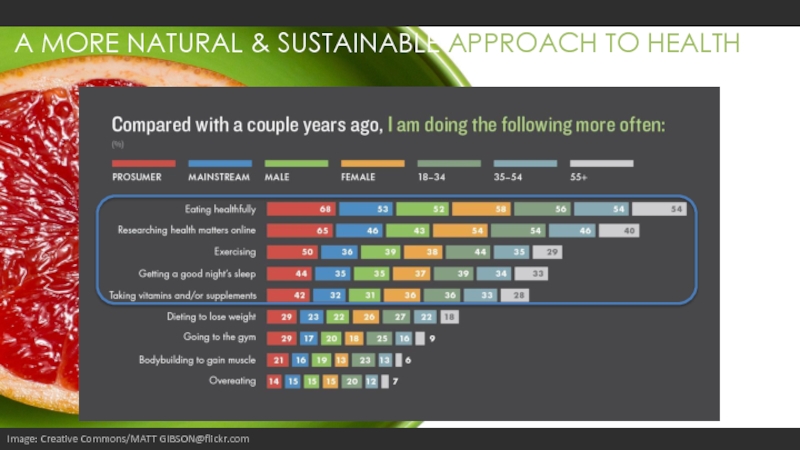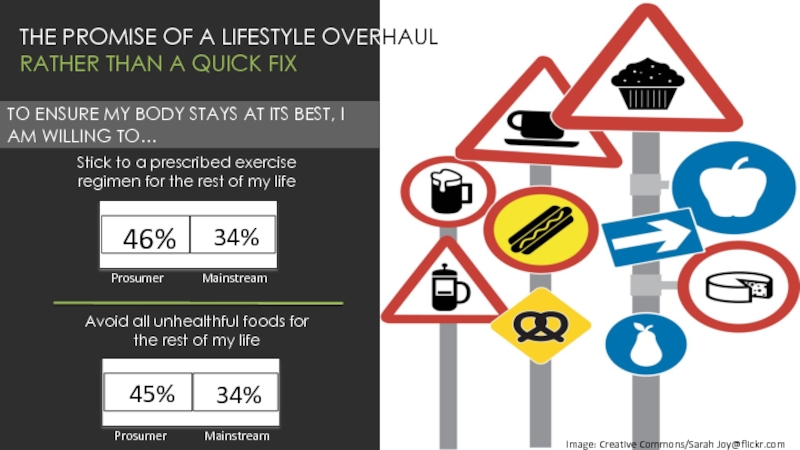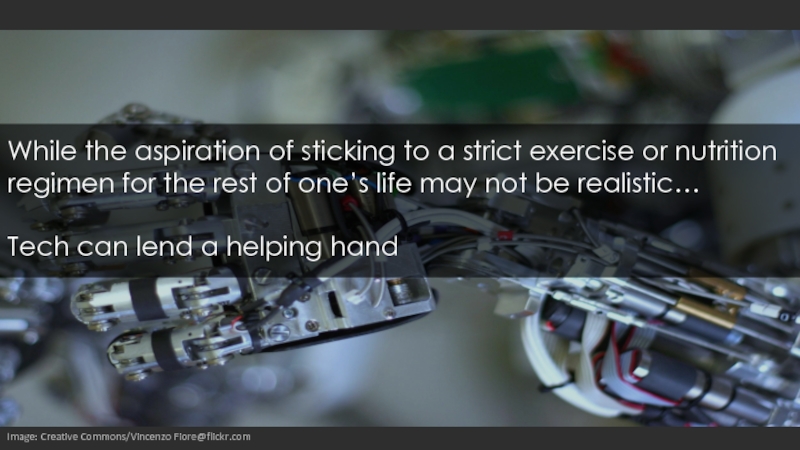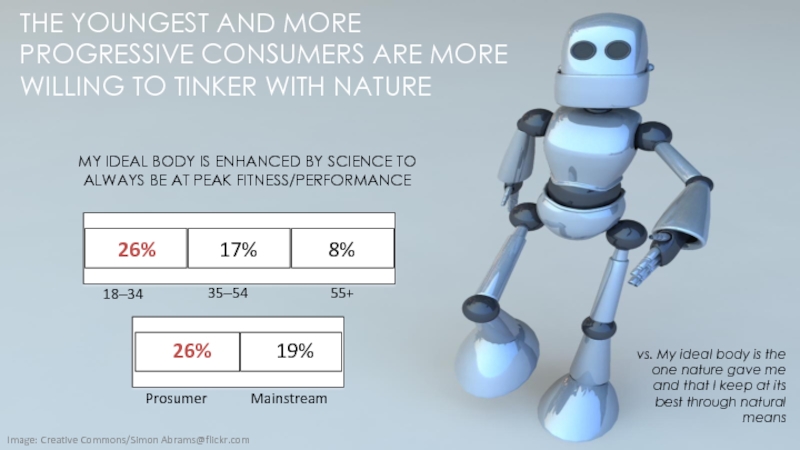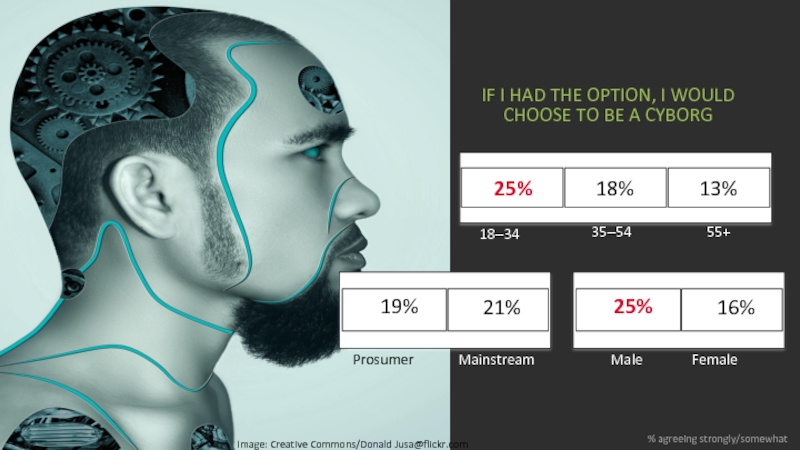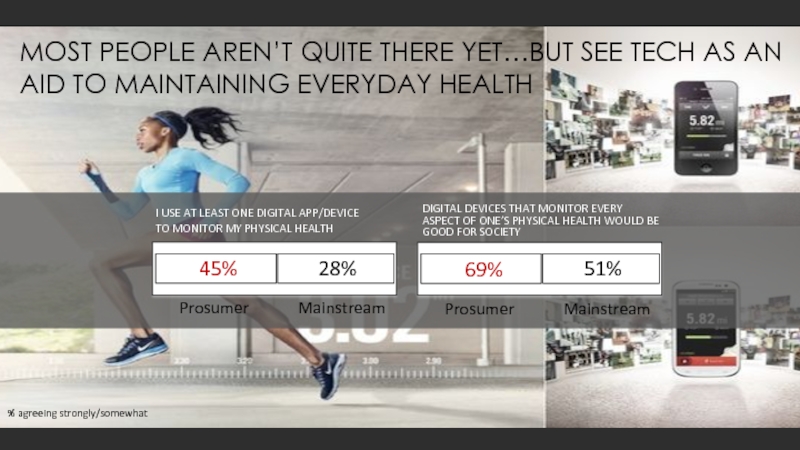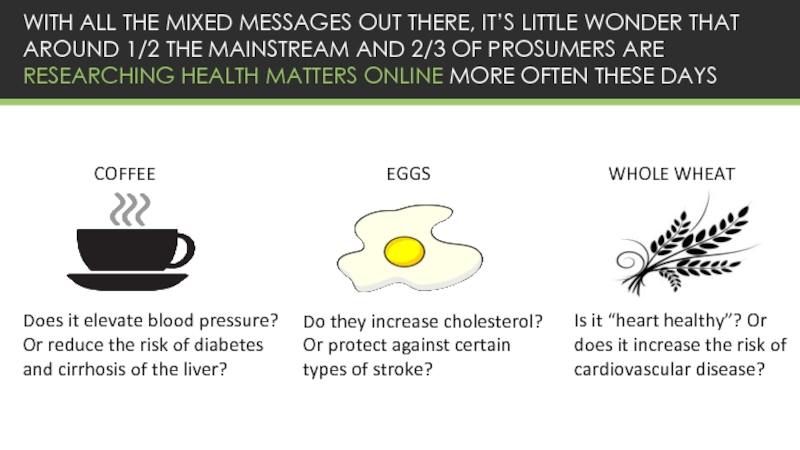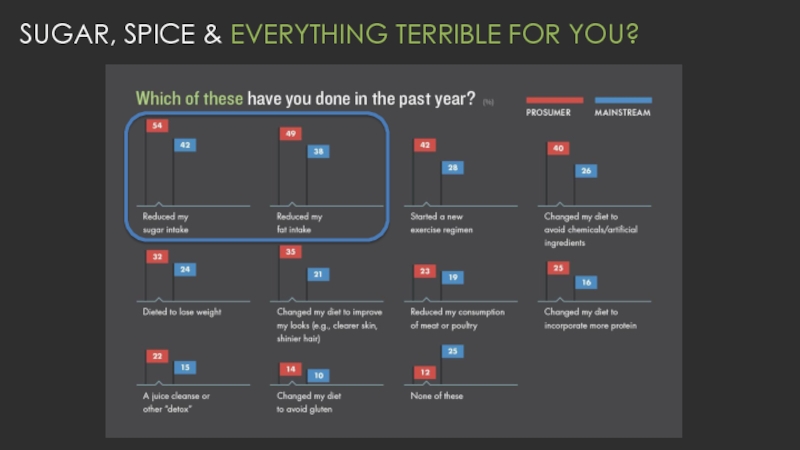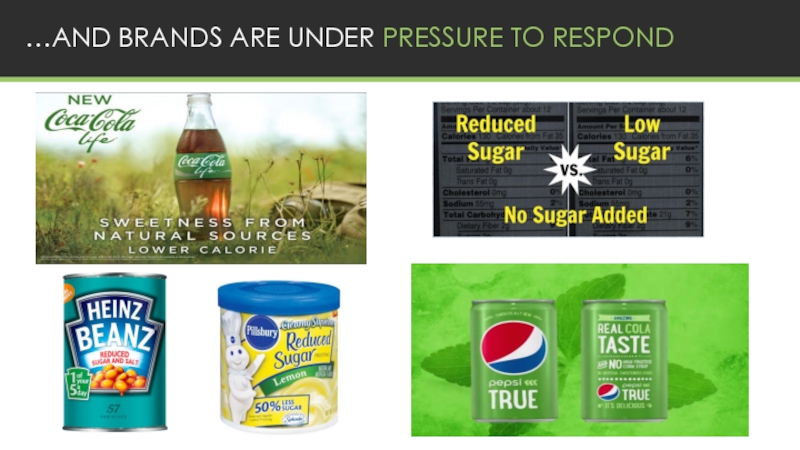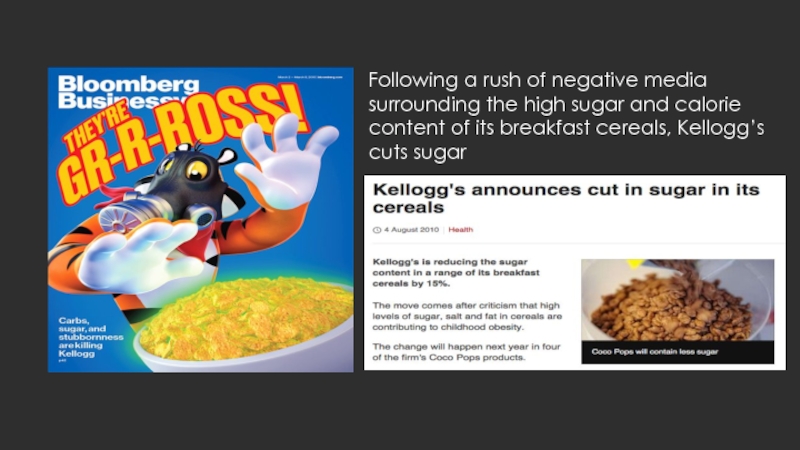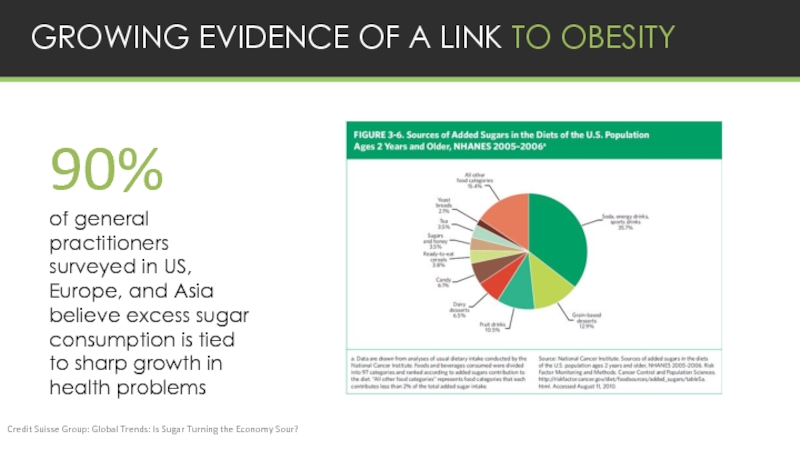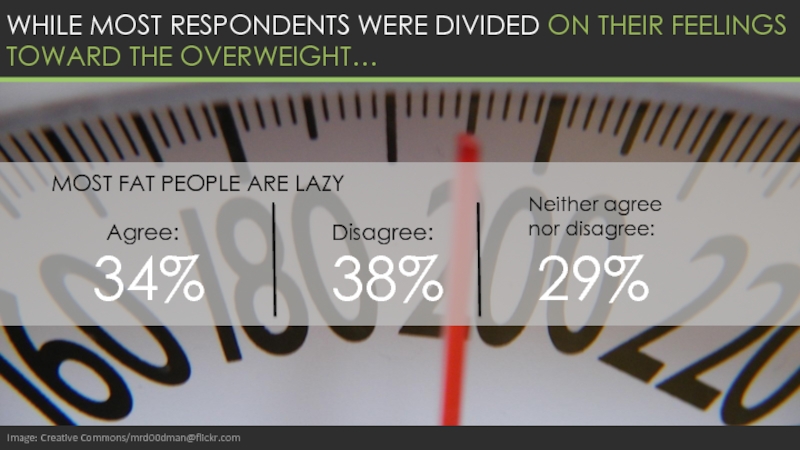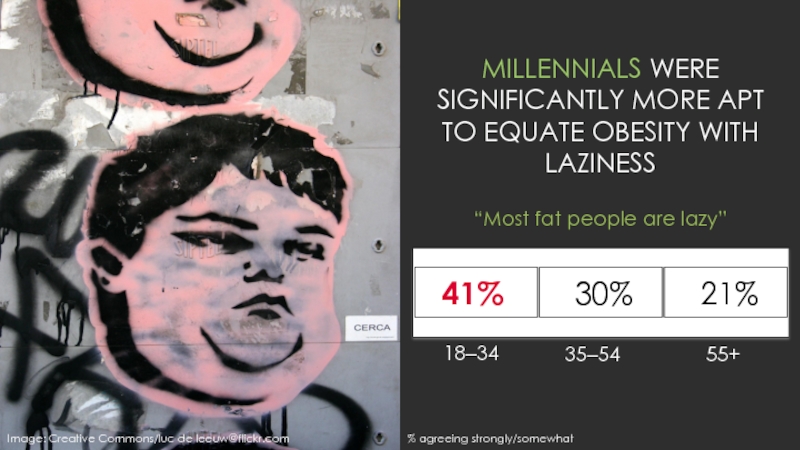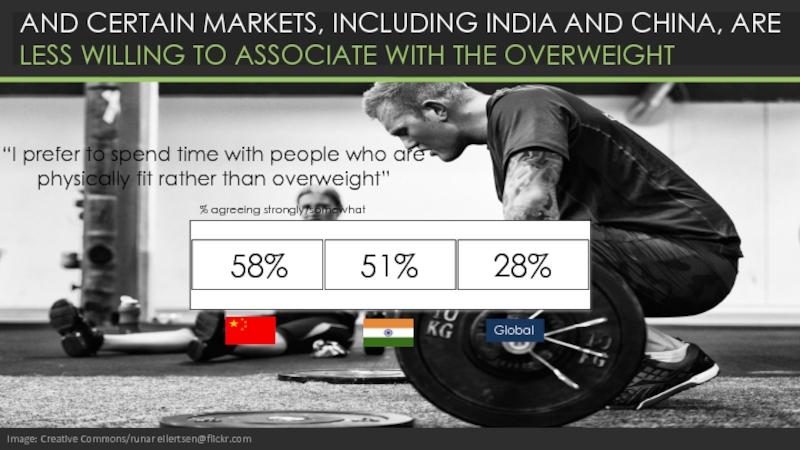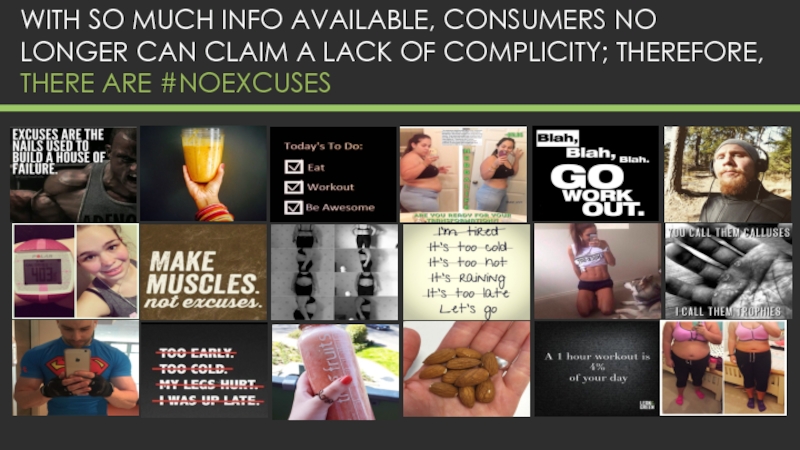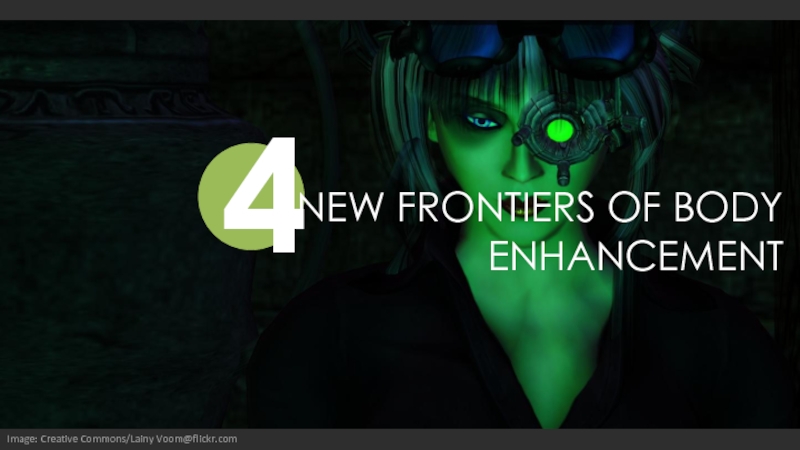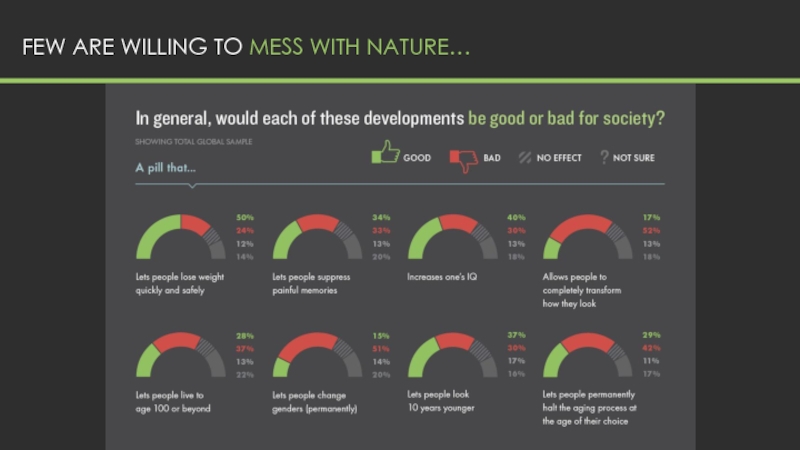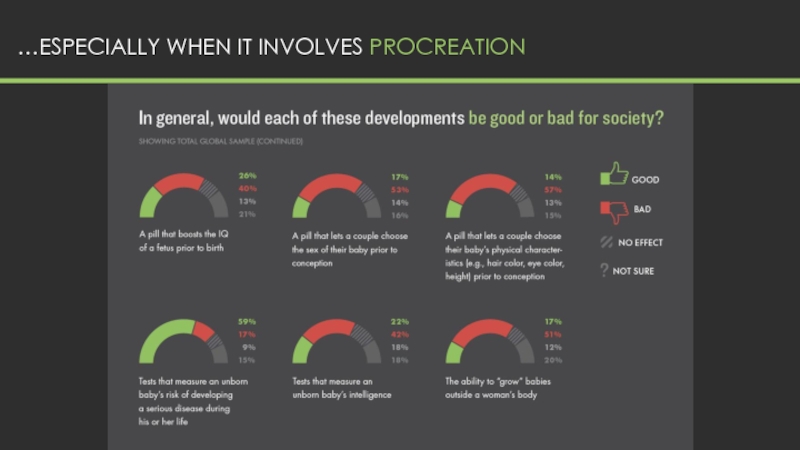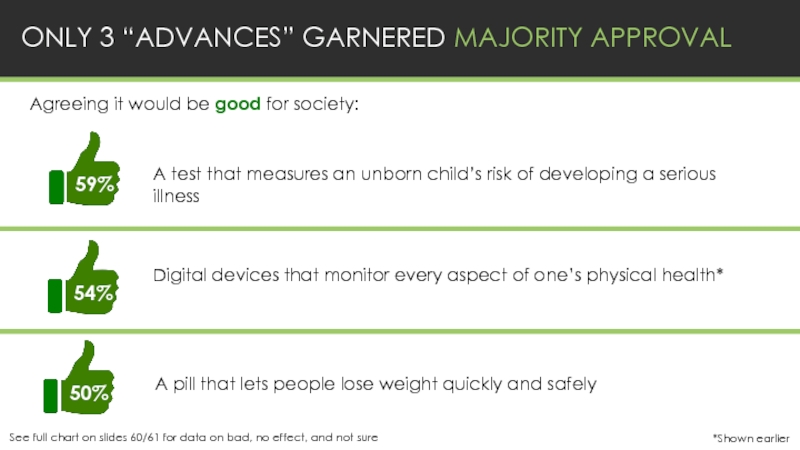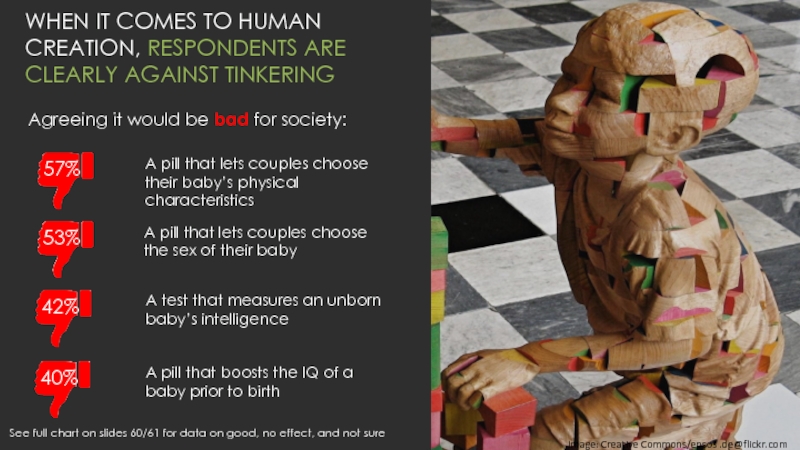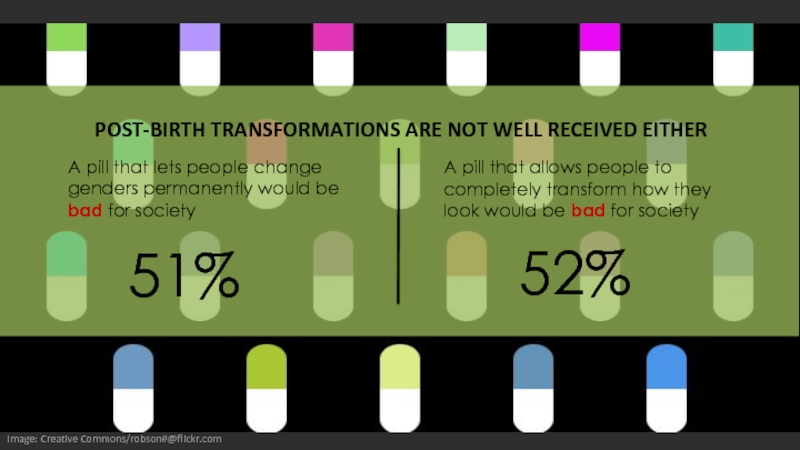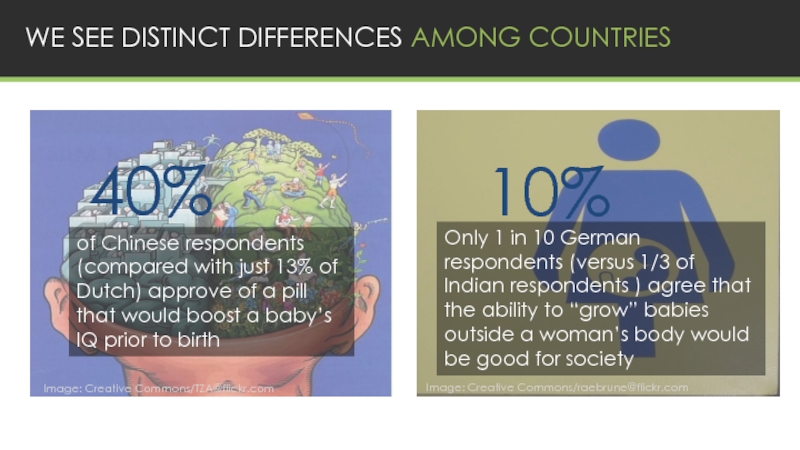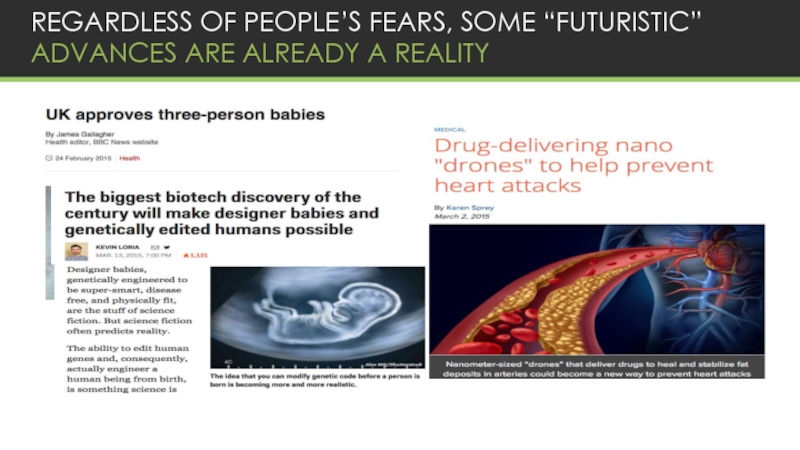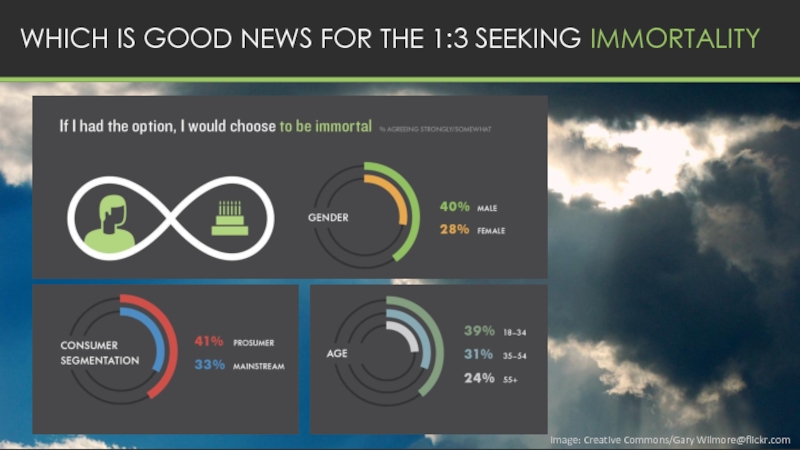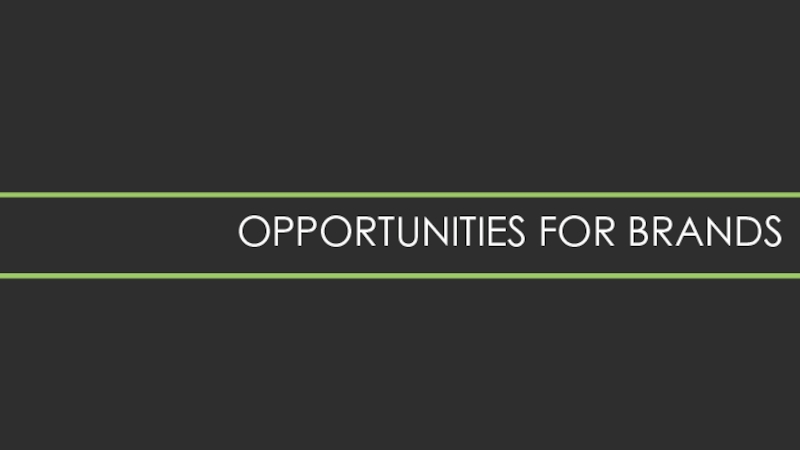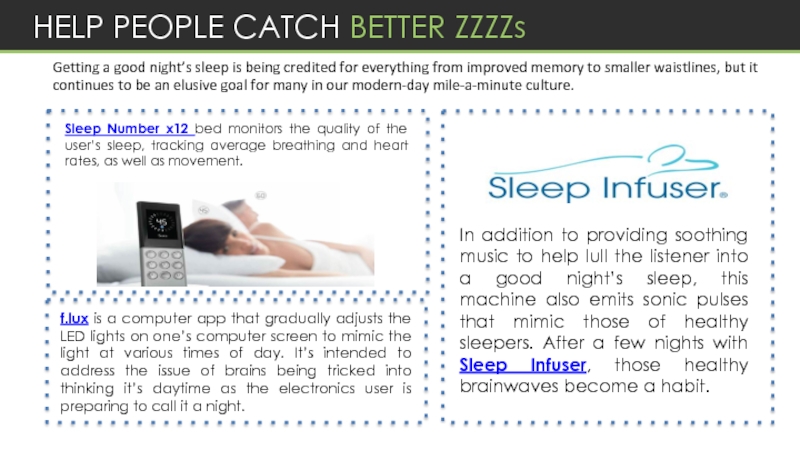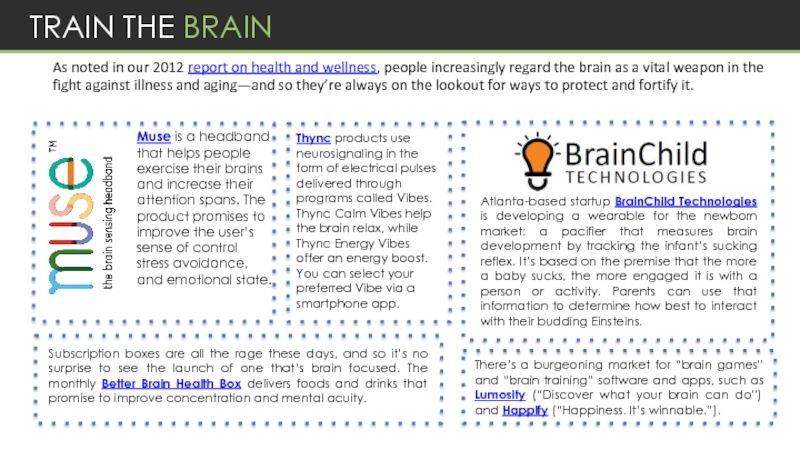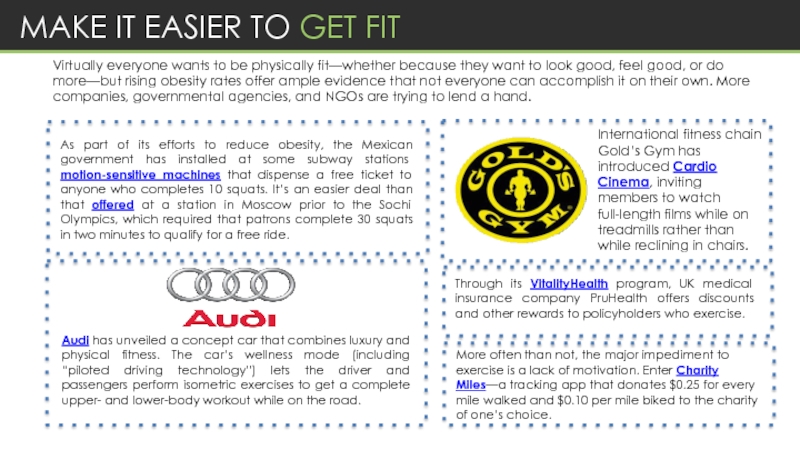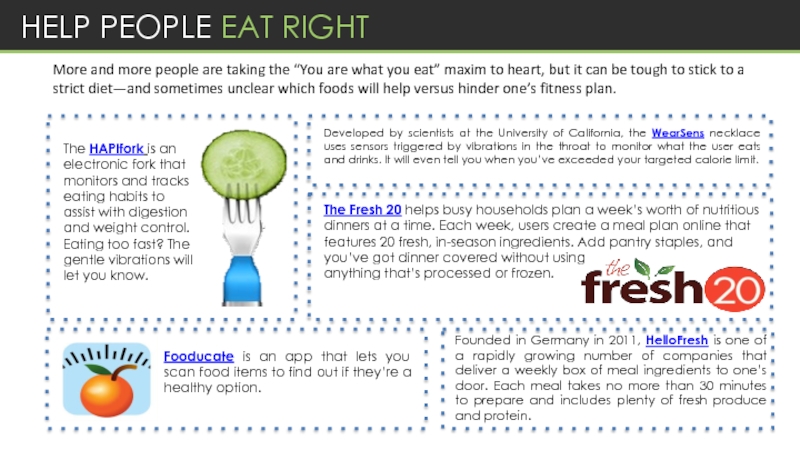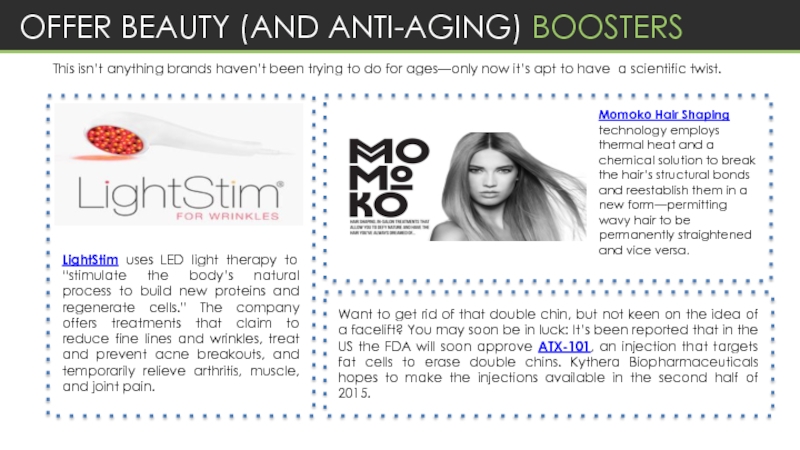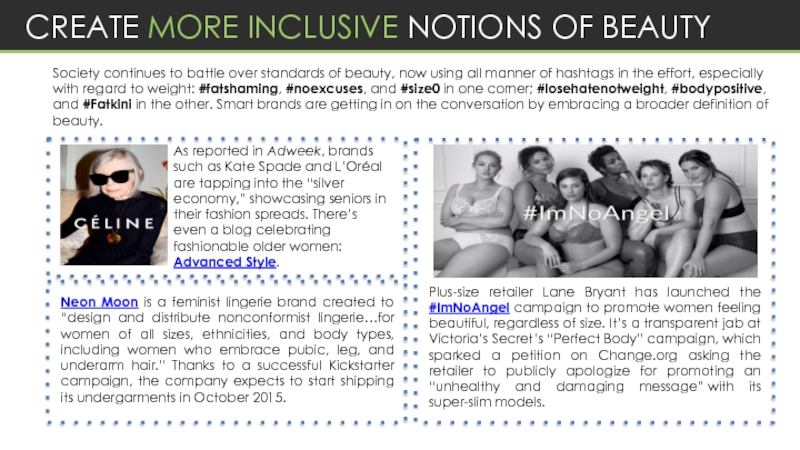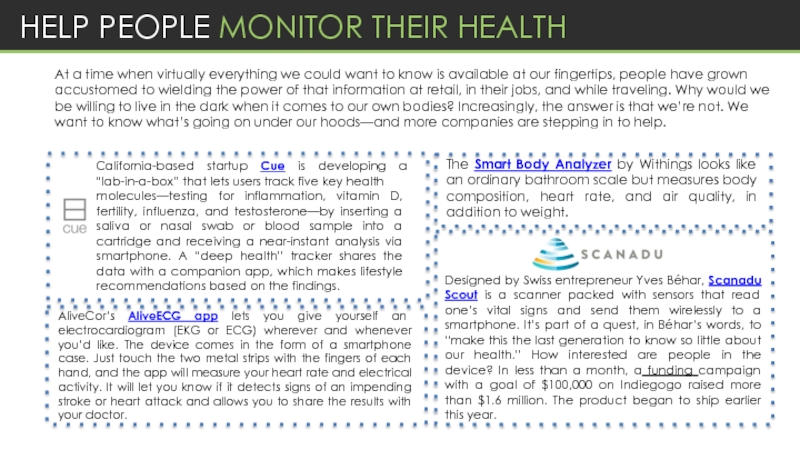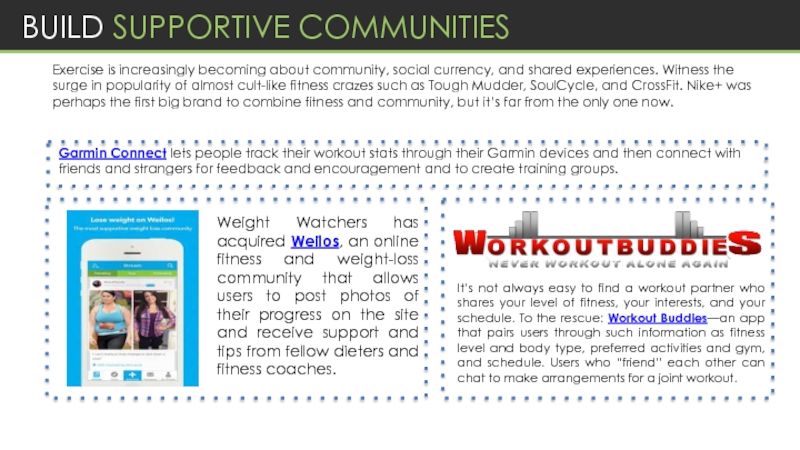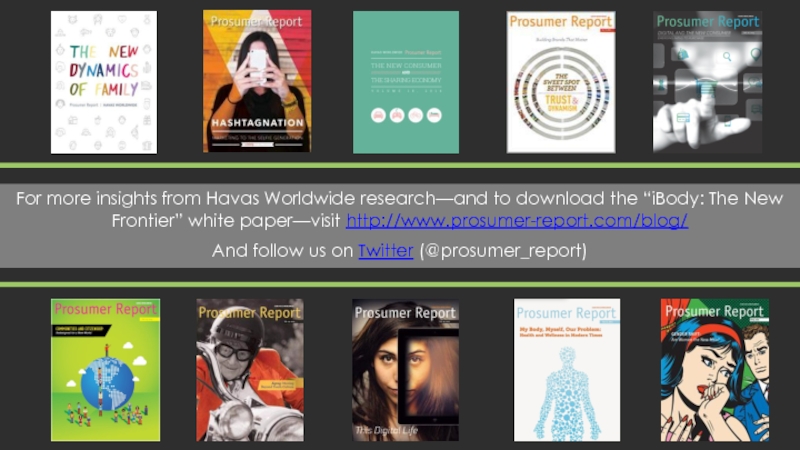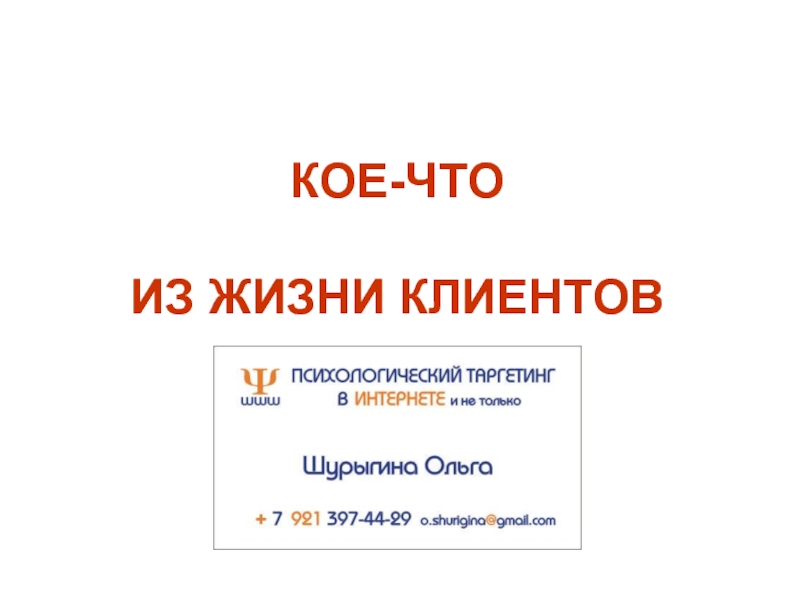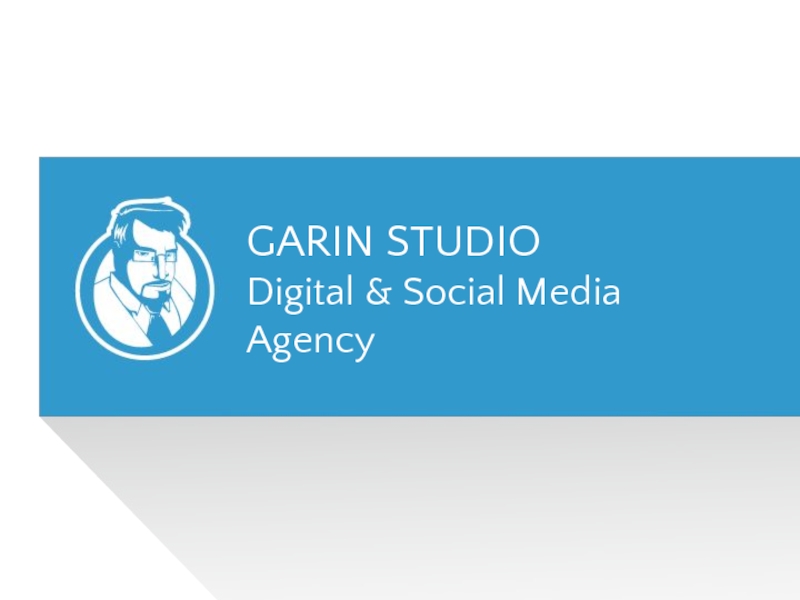- Главная
- Разное
- Дизайн
- Бизнес и предпринимательство
- Аналитика
- Образование
- Развлечения
- Красота и здоровье
- Финансы
- Государство
- Путешествия
- Спорт
- Недвижимость
- Армия
- Графика
- Культурология
- Еда и кулинария
- Лингвистика
- Английский язык
- Астрономия
- Алгебра
- Биология
- География
- Детские презентации
- Информатика
- История
- Литература
- Маркетинг
- Математика
- Медицина
- Менеджмент
- Музыка
- МХК
- Немецкий язык
- ОБЖ
- Обществознание
- Окружающий мир
- Педагогика
- Русский язык
- Технология
- Физика
- Философия
- Химия
- Шаблоны, картинки для презентаций
- Экология
- Экономика
- Юриспруденция
Taking Charge of Our Bodies презентация
Содержание
- 2. Image: Creative Commons/Asher isbrucker@flickr.com For more than
- 3. IN THIS STUDY, WE EXAMINE SHIFTING ATTITUDES
- 4. HAVAS WORLDWIDE ● 2015 GLOBAL PROSUMER
- 5. FOR CENTURIES, PEOPLE DIDN’T FULLY OWN
- 6. IN RECENT DECADES, WE’VE SEE UNPRECEDENTED MOVEMENT
- 7. NOW MEN, TOO, ARE CLAIMING THEIR RIGHTS
- 8. Who owns your body? 81% “Myself” Image: Creative Commons/Matus Gul’ava@flickr.com OUR BODIES BELONG TO US…
- 9. …AND HAVE BECOME A CANVAS FOR SELF-EXPRESSION Image: Creative Commons/William Cho@flickr.com
- 10. DESPITE THE NEGATIVE HEADLINES, #WE♥OURBODIES
- 11. (ALBEIT WITH CLEAR CULTURAL DISTINCTIONS)
- 12. So, now that people are taking ownership
- 13. WE’LL EXPLORE 4 KEY FINDINGS: A typology
- 14. Image: Creative Commons/Luke Larsson@flickr.com 1 A TYPOLOGY OF BODY PERSPECTIVES
- 15. Our respective cultures influence how we feel about our bodies Image: Creative Commons/Herbalizer@flickr.com
- 16. 28 Countries, 3 Key Body Perspectives Hybrids
- 17. LAID-BACK RELAXED FUN VALUE EXPERIENCE EXCITEMENT ADVENTURE
- 18. SEEKING FUN, AMUSEMENT & EXCITEMENT
- 19. PLEASURE SEEKERS ARE MORE AT
- 20. IT’S NOT SIMPLY A MATTER
- 21. THEY’RE ALSO NOT OPPOSED TO
- 22. BALANCED NATURAL HOLISTIC ADAPTIVE LISTEN TO THE
- 23. HOLISTIC ENTHUSIASTS ARE MORE TUNED IN TO
- 24. FOCUSED ON PREVENTING ILLNESSES RATHER THAN
- 25. NATURE IS NOT JUST RESPECTED
- 26. THE FUNCTIONALISTS (AUSTRALIA, JAPAN, MALAYSIA, NETHERLANDS,
- 27. FUNCTIONALISTS SEE THE BODY AS A MACHINE— SOMETHING TO BE USED & PERFECTED
- 28. THEY’RE ASHAMED WHEN THEIR
- 29. LOOKING FOR A “MIRACLE” TO OBTAIN THIS IDEAL BODY
- 30. RARELY SATISFIED WITH THE OUTCOME MY BODY IS A SOURCE OF PRIDE
- 31. WHILE EACH PERSPECTIVE OFFERS A DIFFERENT APPROACH
- 32. Image: Creative Commons/Joe 13@flickr.com ONLY 1/2
- 33. 2 “BEAUTY FATIGUE” & HIGH-TECH SOLUTIONS Image: Creative Commons/P-J-Trash@flickr.com
- 34. PEOPLE HAVE GROWN WEARY OF STRICT STANDARDS OF BEAUTY
- 35. DOES ANYONE EVEN KNOW WHAT “TRUE BEAUTY” IS ANYMORE? % agreeing strongly/somewhat
- 36. MAKING WAY FOR A MORE NATURAL PATH TO BEAUTY (AND LIVING)
- 37. FEWER PEOPLE ARE IGNORING THE BENEFITS OF
- 38. EXERCISING MORE FOR HOW IT MAKES
- 40. STRONG IS THE NEW SKINNY
- 41. TAKING LESSONS FROM THE EAST 75% of
- 42. A MORE NATURAL & SUSTAINABLE APPROACH TO HEALTH Image: Creative Commons/MATT GIBSON@flickr.com
- 43. Image: Creative Commons/Sarah Joy@flickr.com THE PROMISE OF
- 44. While the aspiration of sticking to
- 45. MY IDEAL BODY IS ENHANCED BY SCIENCE
- 46. IF I HAD THE OPTION, I WOULD
- 47. MOST PEOPLE AREN’T QUITE THERE YET…BUT SEE
- 48. WITH ALL THE MIXED MESSAGES OUT THERE,
- 49. 3 SUGAR & FAT = THE NEW
- 50. SUGAR, SPICE & EVERYTHING TERRIBLE FOR YOU?
- 51. PEOPLE ARE BEING MADE MORE AWARE OF THE DANGERS OF EXCESSIVE SUGAR CONSUMPTION
- 52. …AND BRANDS ARE UNDER PRESSURE TO RESPOND
- 53. Following a rush of negative media surrounding
- 54. GROWING EVIDENCE OF A LINK TO OBESITY
- 55. WHILE MOST RESPONDENTS WERE DIVIDED ON THEIR
- 56. “Most fat people are lazy” MILLENNIALS WERE
- 57. AND CERTAIN MARKETS, INCLUDING INDIA AND CHINA,
- 58. WITH SO MUCH INFO AVAILABLE, CONSUMERS NO
- 59. 4 NEW FRONTIERS OF BODY ENHANCEMENT Image: Creative Commons/Lainy Voom@flickr.com
- 60. FEW ARE WILLING TO MESS WITH NATURE…
- 61. …ESPECIALLY WHEN IT INVOLVES PROCREATION
- 62. ONLY 3 “ADVANCES” GARNERED MAJORITY APPROVAL A
- 63. See full chart on slides 60/61 for
- 64. POST-BIRTH TRANSFORMATIONS ARE NOT WELL
- 65. WE SEE DISTINCT DIFFERENCES AMONG COUNTRIES of
- 66. REGARDLESS OF PEOPLE’S FEARS, SOME “FUTURISTIC” ADVANCES ARE ALREADY A REALITY
- 67. Image: Creative Commons/Gary Wilmore@flickr.com WHICH IS GOOD NEWS FOR THE 1:3 SEEKING IMMORTALITY
- 68. OPPORTUNITIES FOR BRANDS
- 69. HELP PEOPLE CATCH BETTER ZZZZs In
- 70. TRAIN THE BRAIN As noted in our
- 71. MAKE IT EASIER TO GET FIT Virtually
- 72. HELP PEOPLE EAT RIGHT More and more
- 73. Momoko Hair Shaping technology employs thermal heat
- 74. CREATE MORE INCLUSIVE NOTIONS OF BEAUTY Society
- 75. HELP PEOPLE MONITOR THEIR HEALTH At a
- 76. BUILD SUPPORTIVE COMMUNITIES Exercise is increasingly becoming
- 77. For more insights from Havas
- 78. HAVAS WORLDWIDE To find out
Слайд 2Image: Creative Commons/Asher isbrucker@flickr.com
For more than a decade, Havas Worldwide has
Key characteristics:
Embrace innovation
Constantly seek out information and experiences
Enthusiastic adopters of new media and technologies
“Human media” who transport attitudes and ideas
Marketing savvy and demanding of brand partners
Highly influential and sought-after for opinions and recommendations
20% of the 2015 sample qualify as Prosumers
Слайд 3IN THIS STUDY, WE EXAMINE SHIFTING ATTITUDES TOWARD THE BODY
Image:
Including:
Perspectives on the body and physical health
Attitudes toward beauty
Responses to technological advances
The role of brands
Слайд 4
HAVAS WORLDWIDE ● 2015 GLOBAL PROSUMER STUDY
Australia ● Belgium ● Brazil
United Kingdom ● United States
Слайд 5FOR CENTURIES, PEOPLE DIDN’T FULLY
OWN THEIR BODIES
Women’s bodies were
Men’s bodies were used for labor of another kind
Image: Creative Commons/Duncan C@flickr.com
Слайд 6IN RECENT DECADES, WE’VE SEE UNPRECEDENTED MOVEMENT TOWARD BODY OWNERSHIP—PRIMARILY LED
Image: Creative Commons/radarxlove@flickr.com
Image: Creative Commons/Charlotte Cooper@flickr.com
Слайд 7NOW MEN, TOO, ARE CLAIMING THEIR RIGHTS
Pushing back against limits on
Слайд 8Who owns your body?
81%
“Myself”
Image: Creative Commons/Matus Gul’ava@flickr.com
OUR BODIES BELONG TO US…
Слайд 12So, now that people are taking ownership of their bodies and
Image: Creative Commons/Martin@flickr.com
Слайд 13WE’LL EXPLORE 4 KEY FINDINGS:
A typology of body perspectives
“Beauty fatigue” and
Sugar and fat as the new
tobacco
New frontiers of body enhancement
Слайд 15Our respective cultures influence how we
feel about our bodies
Image: Creative
Слайд 17LAID-BACK
RELAXED
FUN
VALUE EXPERIENCE
EXCITEMENT
ADVENTURE
PLEASURE SEEKERS
(BRAZIL, CANADA, FRANCE, ITALY, LITHUANIA, SPAIN)
Слайд 19
PLEASURE SEEKERS ARE MORE AT EASE WITH
THEIR BODIES
PLEASURE SEEKERS
GLOBAL TOTAL:
I AM SATISFIED WITH MY LEVEL OF FITNESS
% agree strongly/somewhat
OTHERS
Слайд 20
IT’S NOT SIMPLY A MATTER OF BEING FIT
“I am satisfied with
% of population that is overweight
% agreeing strongly/somewhat
Source: http://www.forbes.com/2007/02/07/worlds-fattest-countries-forbeslife-cx_ls_0208worldfat.html
Слайд 21
THEY’RE ALSO NOT OPPOSED TO ENHANCEMENTS
(AS LONG AS THEY ALSO
Source: International Society of Aesthetic Plastic Surgery, 2013
“First off, I do this for me. These kinds of things you need to do for yourself. And second, there’s nothing better than getting a compliment, right? That you’re good, that you’re sexy.”
—46-year-old cosmetic
surgery devotee (via NPR)
Слайд 22BALANCED
NATURAL
HOLISTIC
ADAPTIVE
LISTEN TO THE BODY
HOLISTIC ENTHUSIASTS
(BELGIUM, CHINA, GERMANY, INDIA, POLAND, UNITED ARAB
Слайд 23HOLISTIC ENTHUSIASTS ARE MORE TUNED IN TO NATURE
In China and India,
Слайд 24FOCUSED ON PREVENTING ILLNESSES RATHER
THAN REACTING TO THEM
57% of Indians
Слайд 25
NATURE IS NOT JUST RESPECTED BUT REVERED
I LIKE TO SHOW OFF
vs. There are parts of my body that I like to hide/disguise as much as possible
Image: Creative Commons/Ying ZHANG@flickr.com
Слайд 26
THE FUNCTIONALISTS
(AUSTRALIA, JAPAN, MALAYSIA, NETHERLANDS, SINGAPORE, UK, US)
POWERFUL
STRONG
MACHINE
PEAK PERFORMANCE
PERFECTION
FIT
Слайд 28
THEY’RE ASHAMED WHEN THEIR
IDEAL IS NOT ACHIEVED
THERE ARE PARTS
vs. I like to show off my body in its natural state
Слайд 31WHILE EACH PERSPECTIVE OFFERS A DIFFERENT APPROACH TO THE CARE OF
Слайд 32
Image: Creative Commons/Joe 13@flickr.com
ONLY 1/2 THE GLOBAL SAMPLE THINK IT WOULD
(If you’re going to eat your cake, you should have to work it off, too…)
Слайд 37FEWER PEOPLE ARE IGNORING THE BENEFITS OF AN ACTIVE LIFESTYLE AND
Image: Creative Commons/Stevie Spiers Photography@flickr.com
17%
54%
“I don’t exercise”
“Compared with a couple of years ago,
I am overeating less often”
Слайд 38
EXERCISING MORE FOR HOW IT MAKES YOU FEEL— RATHER THAN JUST
Why do you exercise?
Слайд 41TAKING LESSONS FROM THE EAST
75% of Prosumers and 63% of mainstream
Image: Creative Commons/Take back your health conference@flickr.com
*Havas Worldwide 2012 Prosumer Report:
“My Body, Myself, Our Problem: Health and Wellness in Modern Times”
Слайд 42A MORE NATURAL & SUSTAINABLE APPROACH TO HEALTH
Image: Creative Commons/MATT GIBSON@flickr.com
Слайд 43Image: Creative Commons/Sarah Joy@flickr.com
THE PROMISE OF A LIFESTYLE OVERHAUL
RATHER THAN
Stick to a prescribed exercise regimen for the rest of my life
Avoid all unhealthful foods for the rest of my life
TO ENSURE MY BODY STAYS AT ITS BEST, I AM WILLING TO…
Слайд 44
While the aspiration of sticking to a strict exercise or nutrition
Image: Creative Commons/Vincenzo Fiore@flickr.com
Слайд 45MY IDEAL BODY IS ENHANCED BY SCIENCE TO ALWAYS BE AT
Image: Creative Commons/Simon Abrams@flickr.com
THE YOUNGEST AND MORE PROGRESSIVE CONSUMERS ARE MORE WILLING TO TINKER WITH NATURE
vs. My ideal body is the one nature gave me and that I keep at its best through natural means
Слайд 46IF I HAD THE OPTION, I WOULD CHOOSE TO BE A
Image: Creative Commons/Donald Jusa@flickr.com
% agreeing strongly/somewhat
Слайд 47MOST PEOPLE AREN’T QUITE THERE YET…BUT SEE TECH AS AN AID
DIGITAL DEVICES THAT MONITOR EVERY ASPECT OF ONE’S PHYSICAL HEALTH WOULD BE GOOD FOR SOCIETY
I USE AT LEAST ONE DIGITAL APP/DEVICE TO MONITOR MY PHYSICAL HEALTH
% agreeing strongly/somewhat
Слайд 48WITH ALL THE MIXED MESSAGES OUT THERE, IT’S LITTLE WONDER THAT
COFFEE
EGGS
Does it elevate blood pressure? Or reduce the risk of diabetes and cirrhosis of the liver?
Do they increase cholesterol? Or protect against certain types of stroke?
WHOLE WHEAT
Is it “heart healthy”? Or does it increase the risk of cardiovascular disease?
Слайд 53Following a rush of negative media surrounding the high sugar and
Слайд 54GROWING EVIDENCE OF A LINK TO OBESITY
90%
of general practitioners
Credit Suisse Group: Global Trends: Is Sugar Turning the Economy Sour?
Слайд 55WHILE MOST RESPONDENTS WERE DIVIDED ON THEIR FEELINGS TOWARD THE OVERWEIGHT…
MOST FAT PEOPLE ARE LAZY
Agree:
Disagree:
Neither agree
nor disagree:
34%
38%
29%
Image: Creative Commons/mrd00dman@flickr.com
Слайд 56“Most fat people are lazy”
MILLENNIALS WERE SIGNIFICANTLY MORE APT TO EQUATE
% agreeing strongly/somewhat
Image: Creative Commons/luc de leeuw@flickr.com
Слайд 57AND CERTAIN MARKETS, INCLUDING INDIA AND CHINA, ARE LESS WILLING TO
Image: Creative Commons/runar eilertsen@flickr.com
“I prefer to spend time with people who are physically fit rather than overweight”
% agreeing strongly/somewhat
Слайд 58WITH SO MUCH INFO AVAILABLE, CONSUMERS NO LONGER CAN CLAIM A
Слайд 62ONLY 3 “ADVANCES” GARNERED MAJORITY APPROVAL
A test that measures an unborn
Digital devices that monitor every aspect of one’s physical health*
A pill that lets people lose weight quickly and safely
*Shown earlier
Agreeing it would be good for society:
See full chart on slides 60/61 for data on bad, no effect, and not sure
Слайд 63See full chart on slides 60/61 for data on good, no
Image: Creative Commons/epsos .de@flickr.com
WHEN IT COMES TO HUMAN CREATION, RESPONDENTS ARE CLEARLY AGAINST TINKERING
Agreeing it would be bad for society:
Слайд 64
POST-BIRTH TRANSFORMATIONS ARE NOT WELL RECEIVED EITHER
A pill that lets
51%
52%
A pill that allows people to completely transform how they look would be bad for society
Image: Creative Commons/robson#@flickr.com
Слайд 65WE SEE DISTINCT DIFFERENCES AMONG COUNTRIES
of Chinese respondents (compared with just
40%
Only 1 in 10 German respondents (versus 1/3 of Indian respondents ) agree that the ability to “grow” babies outside a woman’s body would be good for society
10%
Image: Creative Commons/TZA@flickr.com
Image: Creative Commons/raebrune@flickr.com
Слайд 67
Image: Creative Commons/Gary Wilmore@flickr.com
WHICH IS GOOD NEWS FOR THE 1:3 SEEKING
Слайд 69HELP PEOPLE CATCH BETTER ZZZZs
In addition to providing soothing music to
f.lux is a computer app that gradually adjusts the LED lights on one’s computer screen to mimic the light at various times of day. It’s intended to address the issue of brains being tricked into thinking it’s daytime as the electronics user is preparing to call it a night.
Sleep Number x12 bed monitors the quality of the user’s sleep, tracking average breathing and heart rates, as well as movement.
Getting a good night’s sleep is being credited for everything from improved memory to smaller waistlines, but it continues to be an elusive goal for many in our modern-day mile-a-minute culture.
Слайд 70TRAIN THE BRAIN
As noted in our 2012 report on health and
There’s a burgeoning market for “brain games” and “brain training” software and apps, such as Lumosity (“Discover what your brain can do”) and Happify (“Happiness. It’s winnable.”).
Subscription boxes are all the rage these days, and so it’s no surprise to see the launch of one that’s brain focused. The monthly Better Brain Health Box delivers foods and drinks that promise to improve concentration and mental acuity.
Muse is a headband that helps people exercise their brains and increase their attention spans. The product promises to improve the user’s sense of control stress avoidance, and emotional state.
Thync products use neurosignaling in the form of electrical pulses delivered through programs called Vibes. Thync Calm Vibes help the brain relax, while Thync Energy Vibes offer an energy boost. You can select your preferred Vibe via a smartphone app.
Atlanta-based startup BrainChild Technologies is developing a wearable for the newborn market: a pacifier that measures brain development by tracking the infant’s sucking reflex. It’s based on the premise that the more a baby sucks, the more engaged it is with a person or activity. Parents can use that information to determine how best to interact with their budding Einsteins.
Слайд 71MAKE IT EASIER TO GET FIT
Virtually everyone wants to be physically
As part of its efforts to reduce obesity, the Mexican government has installed at some subway stations motion-sensitive machines that dispense a free ticket to anyone who completes 10 squats. It’s an easier deal than that offered at a station in Moscow prior to the Sochi Olympics, which required that patrons complete 30 squats in two minutes to qualify for a free ride.
Audi has unveiled a concept car that combines luxury and physical fitness. The car’s wellness mode (including “piloted driving technology”) lets the driver and passengers perform isometric exercises to get a complete upper- and lower-body workout while on the road.
International fitness chain Gold’s Gym has introduced Cardio Cinema, inviting members to watch full-length films while on treadmills rather than while reclining in chairs.
More often than not, the major impediment to exercise is a lack of motivation. Enter Charity Miles—a tracking app that donates $0.25 for every mile walked and $0.10 per mile biked to the charity of one’s choice.
Through its VitalityHealth program, UK medical insurance company PruHealth offers discounts and other rewards to policyholders who exercise.
Слайд 72HELP PEOPLE EAT RIGHT
More and more people are taking the “You
The HAPIfork is an electronic fork that monitors and tracks eating habits to assist with digestion and weight control. Eating too fast? The gentle vibrations will let you know.
Fooducate is an app that lets you scan food items to find out if they’re a healthy option.
Founded in Germany in 2011, HelloFresh is one of a rapidly growing number of companies that deliver a weekly box of meal ingredients to one’s door. Each meal takes no more than 30 minutes to prepare and includes plenty of fresh produce and protein.
Developed by scientists at the University of California, the WearSens necklace uses sensors triggered by vibrations in the throat to monitor what the user eats and drinks. It will even tell you when you’ve exceeded your targeted calorie limit.
The Fresh 20 helps busy households plan a week’s worth of nutritious dinners at a time. Each week, users create a meal plan online that features 20 fresh, in-season ingredients. Add pantry staples, and you’ve got dinner covered without using
anything that’s processed or frozen.
Слайд 73Momoko Hair Shaping technology employs thermal heat and a chemical solution
OFFER BEAUTY (AND ANTI-AGING) BOOSTERS
This isn’t anything brands haven’t been trying to do for ages—only now it’s apt to have a scientific twist.
LightStim uses LED light therapy to “stimulate the body’s natural process to build new proteins and regenerate cells.” The company offers treatments that claim to reduce fine lines and wrinkles, treat and prevent acne breakouts, and temporarily relieve arthritis, muscle, and joint pain.
Want to get rid of that double chin, but not keen on the idea of a facelift? You may soon be in luck: It’s been reported that in the US the FDA will soon approve ATX-101, an injection that targets fat cells to erase double chins. Kythera Biopharmaceuticals hopes to make the injections available in the second half of 2015.
Слайд 74CREATE MORE INCLUSIVE NOTIONS OF BEAUTY
Society continues to battle over standards
As reported in Adweek, brands such as Kate Spade and L’Oréal are tapping into the “silver economy,” showcasing seniors in their fashion spreads. There’s even a blog celebrating fashionable older women: Advanced Style.
Plus-size retailer Lane Bryant has launched the #ImNoAngel campaign to promote women feeling beautiful, regardless of size. It’s a transparent jab at Victoria’s Secret’s “Perfect Body” campaign, which sparked a petition on Change.org asking the retailer to publicly apologize for promoting an “unhealthy and damaging message” with its super-slim models.
Neon Moon is a feminist lingerie brand created to “design and distribute nonconformist lingerie…for women of all sizes, ethnicities, and body types, including women who embrace pubic, leg, and underarm hair.” Thanks to a successful Kickstarter campaign, the company expects to start shipping its undergarments in October 2015.
Слайд 75HELP PEOPLE MONITOR THEIR HEALTH
At a time when virtually everything we
California-based startup Cue is developing a “lab-in-a-box” that lets users track five key health
AliveCor’s AliveECG app lets you give yourself an electrocardiogram (EKG or ECG) wherever and whenever you’d like. The device comes in the form of a smartphone case. Just touch the two metal strips with the fingers of each hand, and the app will measure your heart rate and electrical activity. It will let you know if it detects signs of an impending stroke or heart attack and allows you to share the results with your doctor.
Designed by Swiss entrepreneur Yves Béhar, Scanadu Scout is a scanner packed with sensors that read one’s vital signs and send them wirelessly to a smartphone. It’s part of a quest, in Béhar’s words, to “make this the last generation to know so little about our health.” How interested are people in the device? In less than a month, a funding campaign with a goal of $100,000 on Indiegogo raised more than $1.6 million. The product began to ship earlier this year.
The Smart Body Analyzer by Withings looks like an ordinary bathroom scale but measures body composition, heart rate, and air quality, in addition to weight.
molecules—testing for inflammation, vitamin D, fertility, influenza, and testosterone—by inserting a saliva or nasal swab or blood sample into a cartridge and receiving a near-instant analysis via smartphone. A “deep health” tracker shares the data with a companion app, which makes lifestyle recommendations based on the findings.
Слайд 76BUILD SUPPORTIVE COMMUNITIES
Exercise is increasingly becoming about community, social currency, and
Garmin Connect lets people track their workout stats through their Garmin devices and then connect with friends and strangers for feedback and encouragement and to create training groups.
It’s not always easy to find a workout partner who shares your level of fitness, your interests, and your schedule. To the rescue: Workout Buddies—an app that pairs users through such information as fitness level and body type, preferred activities and gym, and schedule. Users who “friend” each other can chat to make arrangements for a joint workout.
Weight Watchers has acquired Weilos, an online fitness and weight-loss community that allows users to post photos of their progress on the site and receive support and tips from fellow dieters and fitness coaches.
Слайд 77
For more insights from Havas Worldwide research—and to download the “iBody:
And follow us on Twitter (@prosumer_report)
Слайд 78
HAVAS WORLDWIDE
To find out how Havas Worldwide can help your
Matt Weiss Global Chief Marketing Officer T +1 212 886 2043 E matt.weiss@havasww.com
For media inquiries, please contact:
Yvonne Bond
Global Communications Director
M +1 646 643 8824 E yvonne.bond@havasww.com
